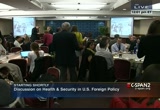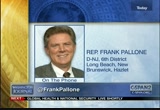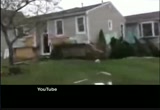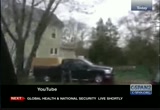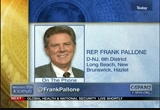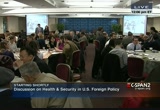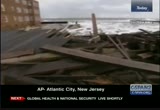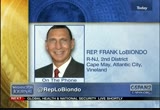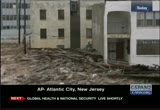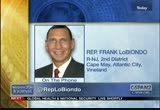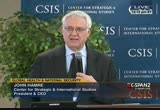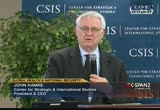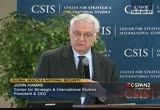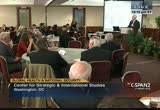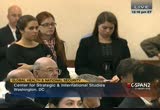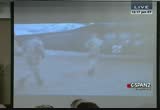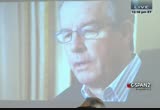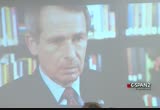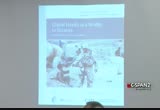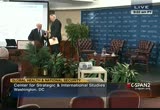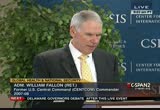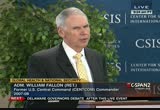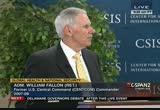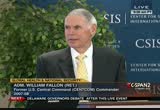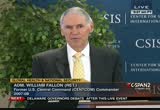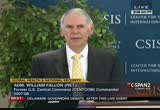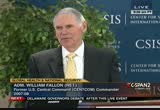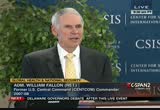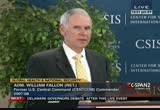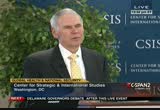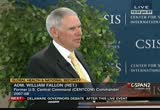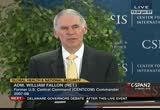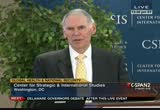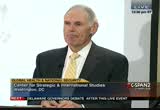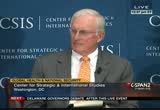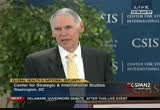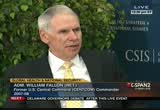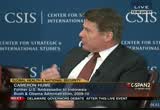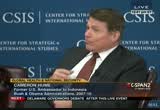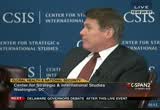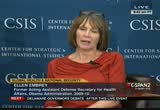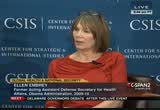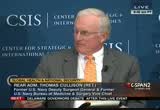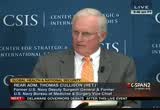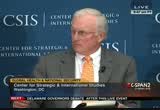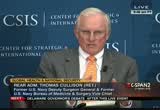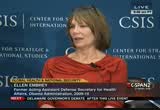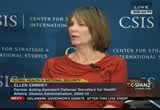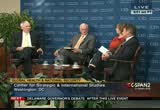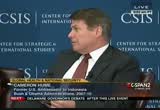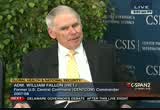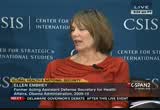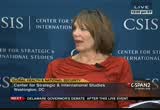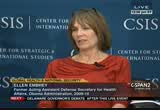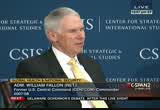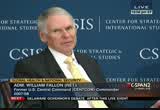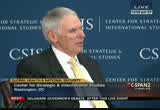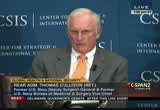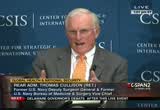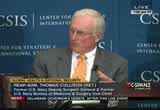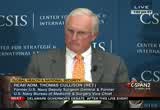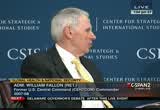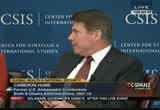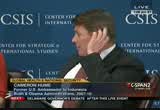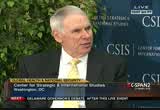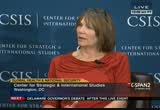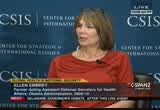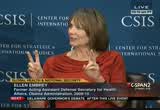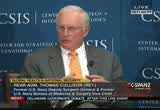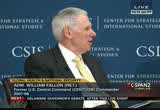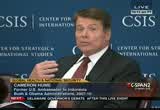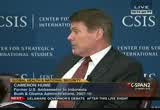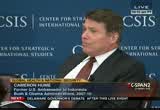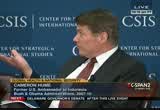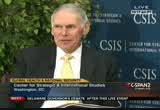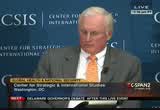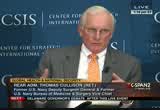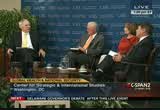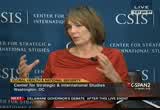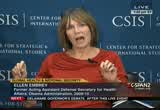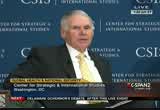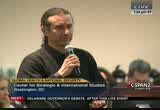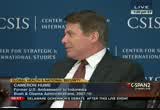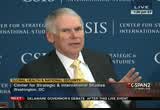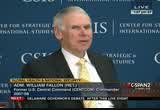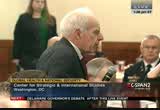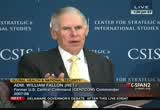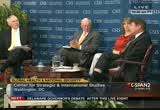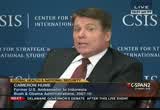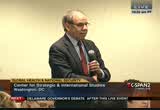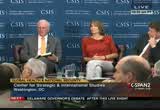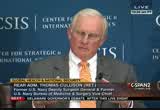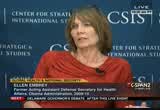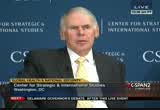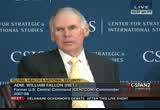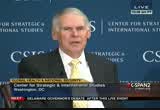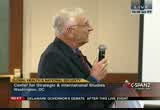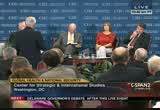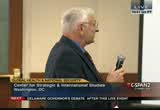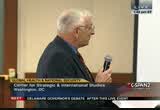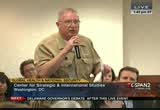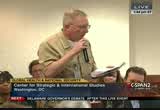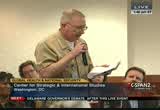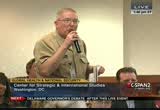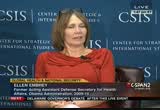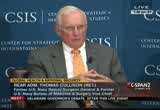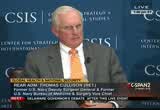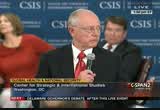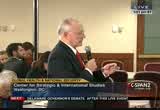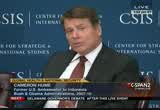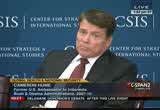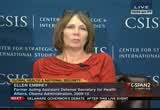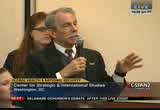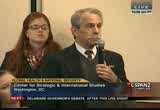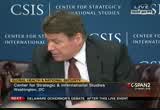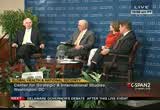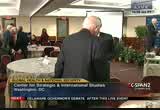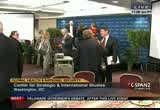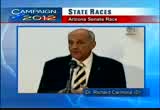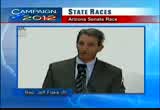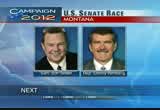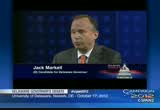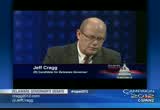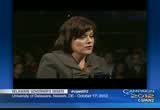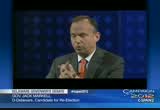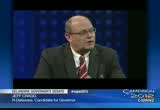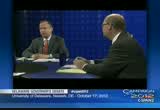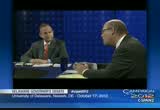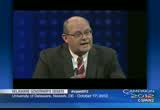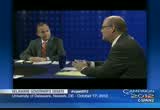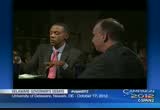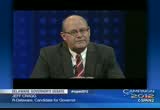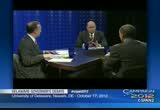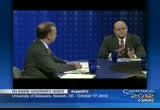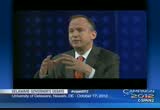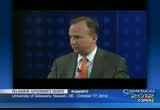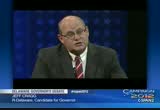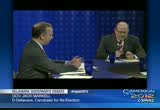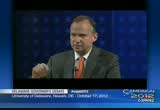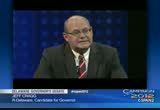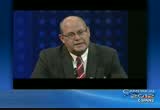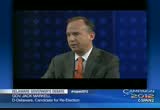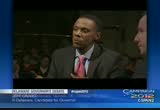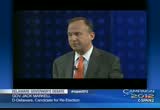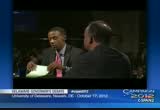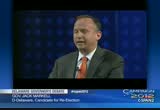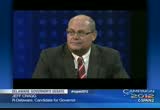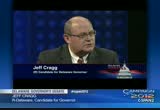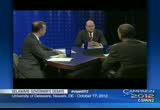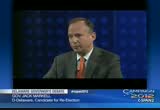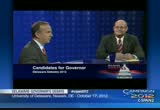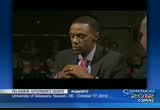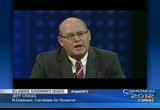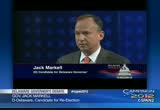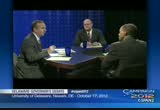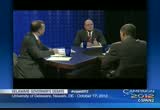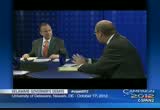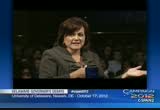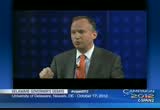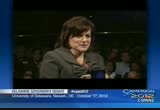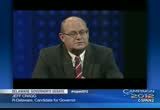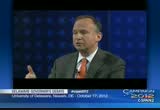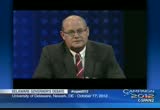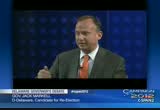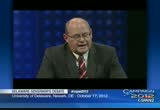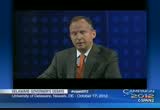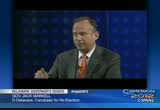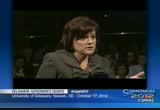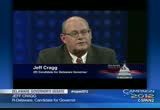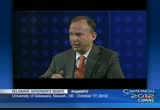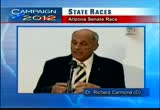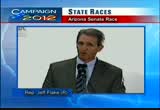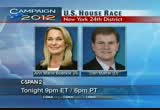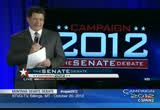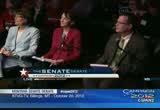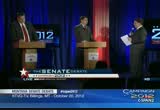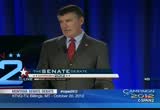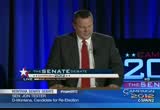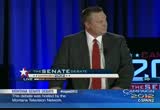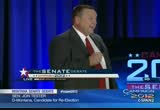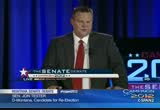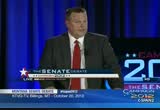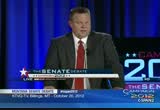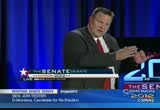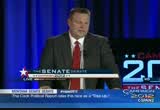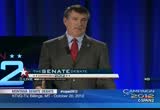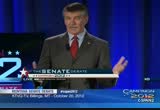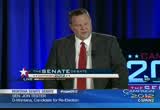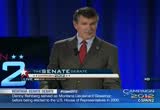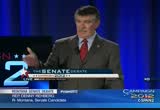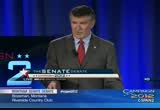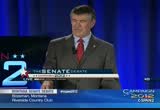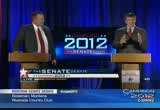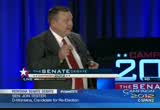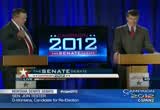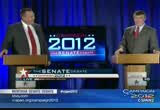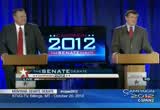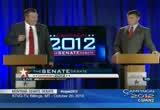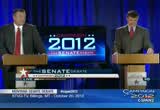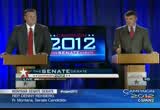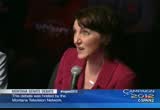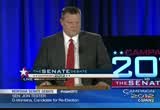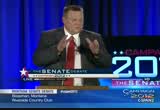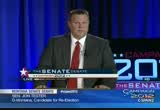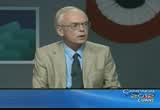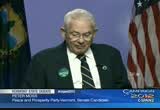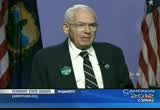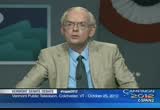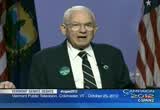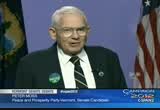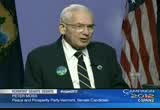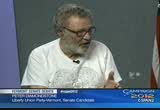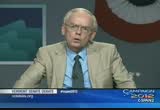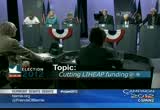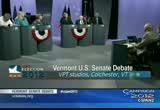tv U.S. Senate CSPAN November 2, 2012 12:00pm-5:00pm EDT
12:00 pm
12:01 pm
under way here on c-span2. right now a discussion of congressmen frank pallone of new jersey where he talks about thel situation with hurricane sandy in his state. >> another new jerseyersey. congressmen this is congressman frank pallone. congressman, thanks for joining us as you go ahead with your recovery efforts there and new jersey our last caller brought up some concern about being able to vote on tuesday after the damage frot the storm.aller brout up a is that going to be a problem ia blljersey? >> guest: wellguest: it may be n the sense of people being able to access a polling place. now, every authority whether it is the governor or the county clerk's -- they assured us that there will be places to vote. but if we have places to vote that are significantly distant from where people traditionally do vote, or where there is an access problem -- that does pose
12:02 pm
a problem. we have to make sure that there is a polling place that is operational, and in a reasonable location for people to vote. you cannot tell people that are in one town that they have got to go to another town to vote. first of all, many of them will not have transportation and you cannot even get gas for the most part. it is a concerned. the concern is real. we have got to make sure that there is not a problem. that there's not a lot of difficulty in reaching a polling place. host: is a short amount of your district, the sixth district, talk about what the federal government is point to do and whether there will be enough funding for the damage out there in new jersey and up and down the east coast. guest: we have got to make sure there is enough funding. this is like to take emergency
12:03 pm
appropriations bill to pay for. there's not enough money for disaster relief. there's got to be an emergency appropriation. i think it has to be robust enough to cover all of this. it is going to be very costly. just looking at where i was yesterday, yesterday i went to bellmawr, new jersey to look at the damage. you have all of the sand that washed away from the beach. you are talking about beach replenishment. and all of the damage to homes. some people have insurance. but for those who do not, or if their insurance is not complete enough to provide insurance, the federal government has got to help out. and i am certain that we will
12:04 pm
pass an appropriations bill to cover this, but it will be in the billions of dollars. i hope our colleagues on both sides of the aisle understand the magnitude of it. we will explain to them that it has to be done. we have to rebuild. we have to bring these towns back to where they were before. and that is part of our job as congressmen and senators, to make sure that this happens. host: remember the energy and commerce committee here in the house. mayor bloomberg talk about the issue of climate change and how after this storm, it is influenced his vote. is climate change going to take on a renewed focus on capitol hill in the wake of hurricane sandy? guest: i would hope so. for those who say that climate change does not exist, i hope they take another look. i have always been an advocate that we needed to address climate change. and that is an important part of
12:05 pm
the congressional agenda. but as you know, on the republican side of the aisle, there has been a lot of opposition to moving forward to addressing this issue. and i hope now that there's a change in heart, this should not be a partisan issue. on global health and of the military hosted by the center for strategic and international studies. still working on a few technical issues and we expect to get underway in a moment on c-span2.
12:06 pm
[inaudible conversations] [inaudible conversations] it appears a will be a moment or two before we get this discussion started on the global health and the military. it's expected to start in just a moment hosted by the center for strategic international studies. we will hear from other new jersey congressman as he sums of the damage in his state as they recover from hurricane sandy. >> host: now we want to turn to new jersey and we are joinedn
12:07 pm
by republican congressman frank lobiondo represents a district down in southern new jersey. congressman, thanks for joining us this morning. >> guest: congressmen and new jersey. first, i want to get the sense of the situation in your district. how bad is it now in southern new jersey? >> new jersey was hit very, very hard. i actually think north jersey was hit a little bit harder than my district. i have the lower third of the state and me congressional district. we have a lot of damage. the atlantic city casinos are still shut down. there is still a ban into atlantic city. some of the other barrier islands have allowed residents to return. the storm has caused infrastructure problems with water and sewer. there is still a lot of people that are out of electricity, and
12:08 pm
it is getting pretty cold at night. i was able to go up with the coast guard in a helicopter tour. and in my district, we have the delaware memorial bridge down along the delaware bay, there was tremendous damage. i was on the ground yesterday, won a small little community of more than 20 homes into the bay. just terrible destruction. we have a massive cleanup effort. people have to come and because stand is 2 or 3 or more feet deep. on the oceanfront, not as much structural damage, although there is some. many of our homes and businesses had two, three, 4 feet of water and in some cases stand even a block or two and. host: you met with president obama when he was out there.
12:09 pm
what did he tell you? guest: he said we would cut through red tape. that is important to us. gov. chris christie declared an emergency a couple of days before the storm hit. president obama signed a declaration that was a critical and necessary first step. we have seen in the past that sometimes the bureaucracy moves slowly and the people on the ground need to help. and they do not get as quickly as they should. the president very publicly to the whole nation, and of course here in my district, he had the director of fema with him. and he said there was to beat no nonsense and we were to cut through the red tape. he gives all telephone numbers to call. and if there was any problem some counties are still doing assessments. a friend committees did their
12:10 pm
assessment yesterday. we should have -- de front communities did in their assessment yesterday. host: will there be enough funding from fema to cover the damages? what did you think will have to deal with when you return from the lame duck session? guest: that is a question i am getting more frequently. we do not know exactly because we do not know the total number. some think it will only be second to katrina. there will be tens of billions of dollars. we are doing a continual resolution until april 1. whether or not that will be enough remains to be seen. every time there's a disaster on the west coast, an earthquake, a flood and the mississippi, a tornado, we pull together as congress, republicans and democrats and do
12:11 pm
what has to be done. i do not expect new jersey will be treated any differently. i know my colleagues in surrounding states, especially in new york and new england states were very hard hit. i have been in contact with republicans and democrats. i think we are going to join together and do what is necessary. we do not know what those numbers are. i think it is premature to speculate too much. we are like the center for strategic and international studies for a look at global health, the military and national security. this discussion just getting underway. >> -- global health, and i think i came to experience it when i was in the department, and it's something that every four-star general and flag officer in the department can at some point is when we take under operations in the world, we have to interact
12:12 pm
in constructive ways with society. it is sent -- it isn't just about storming the beach. it's that you actually have to work in creative and constructive ways with the societies where we undertake operations. security operations inextricably are tied to the relationship with civil society. unfortunately, most of us kind of learn that on-the-job training. it's not something that we necessarily have taught. and - one of the lessons of the last ten years is we've come to realize how very important this is. it's too important to lose the consciousness that we have developed over the last ten years, so we thought this project on global health for security really emerged from this in a conversation that i had with admiral fallon.
12:13 pm
bill had an exceptionally distinguished career serving in three different capacities as a regional, to as a combatant commanders. he's a vice chief of staff of the navy. he touched the military and more profound ways than many flag officers did and grout of the conversation about how this is an important ingredient to our success, but we don't really understand it that well. we as a policy community don't understand it so well. so we thought we ought to learn from this and bill agreed he would be willing to lead this effort for us and i'm very grateful. we decided that we should capture the wisdom and judgment that had been developed over the last ten years by real-life
12:14 pm
experiences. so the document that you have all received i hope is a summation of a series of interviews that the staff has conducted, and i think it's going to be very valuable, very valuable over time. several of the colleagues that are involved in this are going to be here in this panel discussion. that's going to be rear admral tom cullison, dr. ellen embrey, ambassador cameron hume and dr. connie mariano vv we are glad you are not able only to participate but share your perspective today. i think it is going to be a very important conversation. there was another call the who was active with us who was unfortunately not here now. i don't know how many of you new ward. he was a wonderful, fine human being and he served his country
12:15 pm
with great distinction and was an assistant cicatrix for health and human affairs of course and was i think a cardiologists as i recall. he was in texas and he decided the country called him and he volunteered for service very far along in his professional life and unfortunately ward test we recently while he battled cancer for some time. so we think about him today but it was in his spirit he wanted to carry on the content of this work. that would be the best estimate that we could give to his service. i would ask you to think of that as we move forward today. i want to say a special thanks richard downey who was instrumental in pulling together these interviews. and lindsey is so busy organizing, so thanks to her for this and steve morrison of course running the global health projects. before i turn to admiral fallon
12:16 pm
we would like to give a presentation over one of the little stars here at csis and she's put together a multi media thing and then return to julie to get that started and then we will start with a proven and i will ask bill to come up. thank you all for coming. this is going to be a good day. [applause] ♪ >> the events of the past decade have placed an enormous burden on the u.s. military and
12:17 pm
diplomatic officials, to keep us safe and well. 9/11 brought terrorism to our homeland. two wars in iraq and afghanistan have placed around 60 million people in the taliban military. the current outbreak of new, dangerous infectious disease test our ability of strength. the commitment of america's health challenges on hiv/aids, malaria has elevated global health to a new and costly u.s. foreign policy subjective. for the leaders, using these commitments is not only the right thing to do but make sense at a strategic level. >> security has very closely tied together a very basic level we've recognized the health of the country is clearly linked to their prosperity and their
12:18 pm
productivity and their economic well-being. that is key to the stability. >> here at csis the one to understand the decade teach about the nexus between health and security. the senior men and women in our government and military have grappled with these issues. admiral william fallon, former head of both u.s. pacific and central command, spearheaded military engagement during a 48 year career. >> the military has great cadel lenni to respond. i would say that the military is much better suited to the emergency -- we have a terrific logistics capability. we have accumulated medical and medical related capability. >> we found of the decade of military and health challenges
12:19 pm
has spread many solutions particularly in the way we provide medical care to those wounded on the battlefield. >> we learn that controlling the temperature and the hydration of that person makes a difference in the survivability. so now is actually fundamentally changed emergency medicine here in the states. >> despite a were growing understanding of the special role that health plays and global security, how we are organizing the government and military. >> you have your military medical deployed but there are so much nation's capacity it is not deployable medical is a one example as a true difference jeter and a strategic asset, and why wouldn't we have more than
12:20 pm
just the u.s. military? >> we at csis have a discussion on how the united states can both fit health and security in the central policy debates and how our effort to promote health abroad promotes good relationships to keep us safe granholm. >> if you look at the potential for many countries, which right now we don't have a very good relationship with nonthreatening topics such as basic health, hiv/aids, not a communicable diseases, these types of things, this is a reason that we should support very closely both of the uniform and the non-uniform united states capability to go into a country and helped them develop their health system and create a friend out of what could potentially become an ally. >> you can pursue the conversation by going to the website, www.smartglobalhealth.org or find a copy of the report on
12:21 pm
global health as a bridge to security. >> let me take a moment to welcome and introduce admiral fallon. i will skip the part about how he walked across a tidal basin to get here today and he is a very dear friend. he has had a senior commanders. he was of course the head of the central command, the head of the pacific command, he was instrumental in opening up our -- reopening the relations with china and establishing new relations with india. he is in every sense the diplomat for year. what we most admire in our unified combatant commanders. so i want to say thank you, bill, to you for doing this and let's turn it over.
12:22 pm
[applause] >> dr. hamre thank you very much. while we are getting settled here, i will have our panelists, up and get settled into their chairs and order desert. for those of you that nist the chat line, it may be too late. [laughter] but then again, i don't think too many in this room are starving, not the same can be said for others in the world. i wanted to begin with first, in case you missed the copy of this on the way in, we recommend it to your reading and i would say to john and steve thanks for inviting me to participate here in this event and i will get
12:23 pm
into that in a minute on why i think it's important. i would also like to add my voice to the memory trip who contributed as he things to so many things in life to this effort just before he passed away, and quite a remarkable man as john indicated with an amazing list of accomplishments and a relatively short life. so, trip, hopefully you are up their smiling on these efforts and somehow using your powers and spirits to motivate us to do more and do it better. i'd like to say a few things about the effort. the idea to have been to some of our most experienced leaders in
12:24 pm
both civilian and diplomatic and military sides come to get their views and experiences before they tend to disappear into the recesses of their memory so that we can collect the body of firsthand knowledge through the experience of many people who have done a lot of work in recent years in connecting the dots between security, something that i've spent four decades plus involved with, and something that an aspect of this word security that i think is fundamental and very basic. and as i've mentioned to some of you probably heard this in the past, but i will say it again that during my career, my viewpoint has changed significantly in the understanding and definition of what security really is. and my current appreciation is
12:25 pm
it's much more fundamental. much more personal, much more down at the individual human level and i thought it was back in earlier years when we attended certainly in the days of the cold war where i grew up in service to the country where we tended to look at things as those guys and those gals so there was room and was state actors and countries and borders, and that made us in secure and secure or somewhere in between. but as i had a chance to work with people around the world, i realized that it's much more fundamental. it's much more close to each of us. how we feel about ourselves everyday in our outreach to others has a lot to do with how we feel and how comfortable and confident we feel with our fundamental surroundings, and
12:26 pm
health is pretty important, isn't it. so, if you don't enjoy good health and if you are chronically suffering from challenges in the environment or from wherever source, you are going to be not paying a lot of attention to things that are very far away, but how do ye exist, how do i deal with this problem, how do my children and my family deal with these issues and as you are well aware, there are still lots of problems in the world. the good news is there's been a tremendous amount of progress, scientific knowledge that many of you in this room have been major contributors to that. and we have made great strides, and it seems to me that one of the things that ought to motivate us today is to figure out how to leverage the advances in science and medicine directly benefit every person in this
12:27 pm
world that has a need that can be satisfied, salt, resolved or ameliorated by these advancements, and that's a task that we have in front of us. and why i am interested in being here, why i am participating in this and why there is still a lot of work to be done. now that you are all here no one signs the room without signing a pledge to donate a significant amount of your time, effort and largesse to the cause. you wouldn't be here otherwise. so, let's talk a little bit or think a little bit if i can motivate you to do that about this business of our government and our military capabilities and what they can do. as i mentioned, you saw a little tiny blip in the video. i still believe that the biggest thing and the most powerful thing and fastest thing the military can bring to the table
12:28 pm
is disaster response. we have the capability to move quickly and to do things to make a difference. however, there are lots of other things we can do and facilitate, and that is one of the things we are trying to get at in these theories and why it is put together. while we wanted to inform people's minds and what i expect will happen here with the good folks at csis -- steve, taken note -- is they've got to comb through this wisdom or what passes from wisdom from some of us and pick out the things that ought to be worked to the next stage and be able to do things to get it done. but back to fundamentals. the military is a strong right arm of the nation's defense.
12:29 pm
but in the daily activities that we conduct, we do a lot of things that are important not only to the members of the military and the members of this country, but that have a significant effort in advancing the well-being of others in the world. so, we tend to think of the obvious things. we stand for freedom of choice. we stand for people being able to go about their lives free from oppression and things we know a lot about. but in the process of doing that, we had a large group of people and the department of defense. they need medical care, and because many of them are working at a very high operations tempo and under a lot of stress, we want them to be in the absolute highest level of health that we
12:30 pm
can possibly provide. and so, we have a very, very healthy group of folks, and we work overtime to make sure they stay healthy. in the process of doing that, we've learned a lot about people, diseases, physiology and on and on and on. one of the things we have to offer, we in this case i believe being the department of defense in this country is sharing that knowledge with others and figuring out ways in which we can actually explore. it's probably a knowledge and practice in other aerias. another part of the department of defense that is particularly helpful in this regard is the research and development that goes on, and it's unique. it to the best of my knowledge, it isn't done anywhere else and certainly not to the degree that it is. we have hundreds of people dedicated in different places around the world that are looking at specific problem
12:31 pm
areas of inquiry into an environment to better understand the problems, diseases, pathologies, and i am on - ice so i will try to limit my divergence into these matters. the centers that we have that we became pretty familiar with and do research that isn't done in other places. they were certainly self motivated in the early days to make sure that we had our service personnel in the best shape and that we understood what went on in these places and we are better prepared for it, but that body of knowledge grows and i would hope we could continue to nurture it so we could take the lessons from these efforts and move them out into the great world.
12:32 pm
so, to try to pull this together, we have aggressive government military capability that has global reach, very rapid response, high-volume and the means to get into and operate in areas that are prone to disasters and as we have just seen in our own backyards we don't have to go very far these days. nobody else can do this to the extent we can. we have very sharp people, well-educated, well schooled and trained particularly in the medical profession's to make a difference on things. and we have this ongoing research and development as background to make us all better at doing these things. so, these are the basics, and one of the things we would like to draw out today is what else is there that we should understand, what else can we do,
12:33 pm
how can we take these attributes and capabilities and maybe make them better? i won't want to monopolize all the time, but i would like to throw my desire on the table, and that is it's been a great honor, and i have to admit an eye opener at first to go around the world to places that are certainly less privileged than we are and to see the dedicated efforts of so many people not just from this country but many other countries who are trying to make a difference in places that need help with is a medical area or general health and welfare of people advancing their education, let in this venue the fundamental security, personal security through better health, and i see this all over the world, and my big wish is
12:34 pm
that we can figure out ways to connect the various levels of activity. so, these individuals who may be often in remote villages in some distant place in the world leader in a way to make things better for a handful or hundred or couple hundred people measure will freeze first donors, philanthropic individuals that have much greater leverage financially and access to other resources also working a lot of these same problems. and then governments like ours with capabilities like our military. a very quick response. big difference over a short period of time. how do we pull these things together? how do we help ourselves to help others and really make this a better place? it seems to me there are gaps between these things that we
12:35 pm
might want to think about, maybe talk about and i would invite you to help me make my wish come true that these things are much more coherent and we truly have the leverage on the good efforts of so many people to make a difference, but i think that is probably enough to start. what i would like to do is introduce the distinguished panel many are well known to sure but we will start with ambassador cameron hume, a distinguished diplomat who served the country around the world, and in the last three years in indonesia and country of great importance to us politically, economically, security wise and a major player in health. so ambassador, thanks for your efforts in joining us here. ellen embrey no stranger to people in the department of
12:36 pm
defense. in fact, she's much older than she looks. [laughter] she's spent several decades in service across the river and bringing her knowledge and experience to bear to help in the policy world and to make the defense department better performing and better operating in helping us and others in the process. thanks for coming here. the gentleman with my hair color that i like a lot, actually he's very distinguished looking, much better than mine -- [inaudible] just checking. tom cullison, lady rear admral come he was the deputy surgeon general back in the day. he's also much younger than i,
12:37 pm
despite his hair but now he worked out in the pacific for the disaster management and the humanitarian assistance, pretty good deal out there and mice operation that was started by one of my predecessors i thought it was a really great idea and to this body of work that we hope to leverage into something that is even more useful in the individual parts. i will invite somebody off to run off a little bit. the rules are why will pose a couple of questions just to get you warmed up. you can take notes and we will then turned up in the audience and see what is on your mind and feel free to hopefully make a question around a policy statement but put your ideas out there and the objective is to make this a better document to
12:38 pm
understand it and figure out how we can do more with it. thanks very much. [applause] i think we have in this panel and opportunity to benefit from not only the collective wisdom of our distinguished guest here but the fact is they have served in many different capacities during their career and they have some interesting and potentially different views but that's o.k. that's how we learn. so, if i could pose a general question and i will give them off ahead of time i could call on you first but with your sense of this nexus if you would between health and security writ
12:39 pm
large. most folks haven't had an opportunity to read this yet unless they are speed readers like john hamre so if you could share with us your thoughts about what do you see for the connection and what has struck you through the career as things that might illustrate the importance of this or not if that is the case. >> thank you very much, admiral. i would like to go back to the earlier question how do you bring all of this together in this human connective tissue and how do you get the relationship so that the people in the philanthropic organizations and the research organizations and people who were deployed in the field are able to find their own means and collaboration the
12:40 pm
maybe two aspects of this and that is how you deal with the problem as from south africa with aids and how do you want to treat people who have aids, how are you able to make the connection so that over time u-boats prepare the society for a change in policy in terms of cable laid, but it's the same to build some political pressure and a sense of potentiality so that it changes more likely, and i think in that case it's interesting we were able to build the relationships between the u.s. military, the cdc, nih and the south african military that had an interest in treating its own people to begin with the program, which may be opposed to the debt by the minister of health like to call me and that
12:41 pm
is before she went and had her liver replaced for alcoholism. in indonesia it was different. there it was more of a question dealing with the risks of influenza and you build relationships so that a country, a society has the confidence on research capabilities in collaboration with others and they will share early warnings and they will share samples so that research can be done on a global basis. how do you build those personal relationships? if you can think for a minute their risks that u.s. citizens from influenza are huge and its land extending up to 40,000 people a year died in the united states from seasonal wetlands of if we had a real pandemic how many people would become so this is a security that sweeps the
12:42 pm
borders and our best attribute is making that personal connection so that we get the collaboration. >> you have had a chance to view this particularly from the vantage point on the capitol here. what have you seen in the basic relationship with health and security? >> i think that it has no boundaries in terms of the state or country and every country's efforts to address basic human needs, nutrition, health varies by resources, and i can't -- to many to name, but from a national security perspective when the infrastructure is not able to provide health or protect the health of the population it becomes unstable and when the government or the
12:43 pm
people in charge are unable to address that, then you end up with a lot of factors and it is that influenced ability to preserve the peace and work well with others. so from our perspectives especially from those countries that are not our allies that is where global health and a the dod military list of state department's partnering with these countries to help them address their infrastructure and vulnerability in health care. a very basic level, however, i think when we bring in the high-tech stuff it is difficult for them to adopt because the infrastructure problems like electricity, water and things like that. so for me the nexus is if you have an unstable government is not able to provide this, then when the u.s. military to
12:44 pm
collaborate together to help stabilize that. it helps us with information and helps us create the devotee to understand the diseases that are confronting them and to bring in the right resources whether they are ngos or have medicines that could help or whatever that is where we see the biggest push yet been a practitioner out on a point in different places of the world, and recently out in honolulu looking out in the asia-pacific. what's your experience, what do you think about this topic? >> let me talk a little bit about where we got our gray hair. we will take a longer view of one country.
12:45 pm
first and was obviously different times back then and it was 2003 or 2004 and at that point we were really trying to find ways to have military to military contact with the vietnamese what can we talk about and we are trying to find ways to the vietnam military. every military in the world recruit's young people to get them to do very dangerous things so talking about the military is a topic that we all have in common and we don't talk about how to use that military. a surgical product of the
12:46 pm
vietnamese military and their hospitals and a year after that we talked about hiv prevention and the military as a part of the defense hiv/aids programs as a part of the pepfar program and we talked about how you keep a military safe when you want them to do dangerous things but you don't want them to take risks to their health. and that is involved overtime or we've had the visits to vietnam our relationship is much better in the country with steve morrison about two months ago on the loss hospital ship and in my wildest dreams a 1994 imagine that four people could go to a town in the former north viet nam and ask questions of population about how to practice medicine and just to see the evolution of for that time period it really struck me as to the value of military to
12:47 pm
military topics for discussion predators topics we can discuss on many levels and one of the benefits in the u.s. military is keeping devotees from very basic primary care to the sophisticated surgery in the world so whether we are talking to a nation in the developing world were they have a base of surgical capability to want to increase or a country that is just getting started and has major problems about how to start any kind of a health system you have the capability to go discuss that with them with u.s. military positions. but to the point that the ambassador brought up and the point the general brought up in the video, why should it only the medical personnel. one of the values is that it's not only military, its military is ngos and partner nations all working together on a common theme which is health care and sends a couple of very strong
12:48 pm
messages. one is number two different backgrounds can work together. >> if i can go back to ellen in the policy world, how difficult or not to utilize the capabilities within people in the department of defense what issues do you see in the experience of being raised here and is their anything that we need to do about it and looking to solve itself. >> from a policy issue on the health side, we train our physicians to care for and treat the beneficiaries that are eligible for care in the dod. and sometimes when we are engaged and care for others and those that are designated beneficiaries the lawyers get a little sticky.
12:49 pm
so, the fine line that we often blocked was we needed training. we have relationships with countries and we train together to improve our ability to protect our forces and those countries and at the same time built a good will with the military and civilian members as they have infrastructure in the country and that is how we leverage the resources the were built from our own protection but from a policy perspective there was a directive that was built i guess published in 2005 and this is important for our combat operations as it is in a strategy. of those resources have declined so i would say from a policy
12:50 pm
perspective while we believe in this as a strategy, our investment in the strategy there's a lot to be divided in the department of defense. if we could extrapolate the situation from 2005 back to the future to be continuing pressure on those resources. >> ambassador, could you give us a sense from your experience how we are perceived in other countries and would be the whole aspect of the military. there's a potentially useful part of this military presence that goes around the world or what is the ability to actually discerned from other general
12:51 pm
perceptions that are not helpful to us? >> it is uniformly deeply admired to the clear operational half. one of the issues that we had is they refused to allow our hospital ships to visit, and this was i think correctly seen by the people at paycom as a gratuitous insult. why can't we go there and do things that are good for the people getting the treatment? when they do they never explain why they do anything and i came to feel that the best explanation was the opposite side of the deep admiration. was the feeling that some people
12:52 pm
in the indonesian service built up the main consequence of this was showing people we would do good things that their own government failed to do so it was a question of loss of faith. but you know, those things can be fixed when they are fixed by the human relationships and as you suggested doing things together and bringing in civilians closer cooperation on global services on a civilian on military. since then they've had a very good visit. that is the deep admiration. >> how about this kind of inherent conflict in the
12:53 pm
resource demand. what is your assessment of the efficiency if you would of the overall military medical capability and one of the chains and rattles around the building and the halls down the street here of course is to get these individual services and the dod allows them to do this. having been on both sides of the argument what did you see and what do you think about this? is this an issue that is important? >> as a taxpayer and then as a person that is knowledgeable and helped organize and why it is disorganized the way it is. having the confident capability to address the health needs of
12:54 pm
the force to maintain its ability to execute its mission in any way that it serves me is a very strong very capable medical for structure. we have some added expenses to our mission that deals with retirees and our family members which i think's force us to address a broad range of health issues than we would otherwise than as treacly related commission related. and i think that for a variety of reasons, political and otherwise, the best that we can offer is owed to those that can sacrifice so much for this country and their families and the retirees. so part of me says we need to setup fee structure to be able to do that and another part of me says yes, it is very costly and we could probably buy some of that capability for some of the force that we support.
12:55 pm
so, i think we are going to find out how the problem for the last 40 years is going to be addressed because missiles are becoming so scarce right now. we need to retain the capability to address the needs and what ever platform they operate on and i think the need to wear the uniform they support on the platform. they can have a common commander and common practices. they can have, and infrastructures to share and information, and that is where the efficiency can occur but the most cost in the system as the number of people and the infrastructure of the hospitals and of the clinics and things like that. so the only way to reduce that is to reduce the infrastructure and the number of people, and the question is who do you reduce and that is going to require a strong assessment of
12:56 pm
what is actively essential to support the mission revenues and the force of protection of the force and continue to do the kind of things that are important which would include the research, the laboratories, the things that we do has the ability to meet the nexus between global hoeven and the national security. >> you highlighted a couple things i want to make sure that everyone is listening and has an appreciation for that within the depravity fence medical resources, there is not a car out if you what of doctors and their supporting medical staff just deal with people in an act of service and the entire family of active retired and spouses
12:57 pm
and children. we also don't have a reservoir of doctors and nurses and other medical people standing by for the next contingency in the world. so, when we have a war such as the last decade endeavors in iraq and afghanistan, we don't just have a pool of folks that come out of nowhere, these are people that are actively serving in our hospitals and the man and for those vessels comes from other hospitals around the united states that people have pulled off temporarily to man the ships but it brings up another point and that is the complexity of all of this that we need a medical capability that can deal with the day-to-day challenges of
12:58 pm
everyday living but also the special areas to deal with the combat situations, the trauma and the many things that we have we learned a because of technology and other allies in the past decade. as as a continual demand, it seems for the resources to get adequate training and to keep to a readiness at the same time dealing with other things that makes this a much more complex issue than many might appreciate and one of the challenges is when it comes time to resources it is done adequately. sorry for the op-ed. but it's really important, and i found in my experience people don't quite understand this because they are not supposed to and i don't expect that they would know.
12:59 pm
>> tell me a little bit about in your experience what particular things in the tour by difficulties in the military you think have been particularly useful or would be useful in the situations to fight and extend security in the non-traditional ways. >> i can answer that in a lot of different ways. let me start with disaster response. there's been a lot of discussion and a lot of groups over the last eight or ten years about how does the military or other branches of the government, ngos, private enterprise and host nations come together through response for disaster, and people point with regularly back to the indonesian tsunami that occurred in 2004 when the group that was the first unit to respond and the u.s. mercy one of our hospital ships came about a month later and that was one of the first times that the
1:00 pm
1:01 pm
and ways to practice this, if you go, and we look at the nexus between security and health care, why not while we're taking our hospital ships, helping haitian admissions take the people with the sun ships likely to respond to disasters. so if you fast-forward from the saddam in 2042 vacation response for the comfort rather a couple years ago, the ngos on the mission with whom we were six or eight years and more routine. it takes to respond to a disaster on a gamut of health care. ob care for pregnant women, infectious disease, major trauma care, intensive care, intensive
1:02 pm
medicine care and aeromedical transfer, after the regular admissions. the advantage to us as the u.s. military and the u.s. medical capability can do these things. so what were looking for a capability perhaps to work with an ally could watch comes to us with a very specific discussion, how do you guys do so well transporting people who are injured in iraq and afghanistan all the way back to washington d.c. with the nation's capital through germany and your survival rate is so high, yet we have problems in our country to our summer capital and we can't replicate that. how do you do it? i was a very well-developed notion that lacked one aspect of knowledge of medical transport. they have airplanes, tertiary component in the capital. they have good response in the
1:03 pm
provincial region, where incidents were occurring but they couldn't put together the air medical transport. so we say that's the issue as we see as an ac outlet do this. so we were able to teach air medical =tranfour on a country that cannot do that. so by picking specific as we can work on, we can have an effect of hubble to the country, which would be what ambassador hume is talking about. it will be asking for a specific skill set we can teach and do on their own. if we have to respond to a disaster, now we know you can do that. we'll have it ready next time. >> tanks. >> ambassador, what goes on downrange in other countries with these various entities
1:04 pm
working in the health area? individual folks who decide they want to make a difference in go off to some remote place. did you have an opportunity to engage with some of these folks? what was your experience without naming names, but the foundation that have greater leverage and want to make a difference. can you share with us your experience? >> as you are asking question, one word kept coming forward in my mind is confusion. there's a risk of confusion, not a certainty of confusion. you get confusion with the local government in particular does not strong enough leadership capacity or if you're in a place with a weak government, you have perhaps a u.n. operation in the international coordination is
1:05 pm
also leadership. you have confusion. i think one of the highest hurdles to overcome is the residual feeling, often among ngos that they will be contaminated if they do a cooperation with the military. but most places, it's only the military but has been rebuffed logistic capacity to project not only power, but to project water treatment units and sanitation equipment into a remote area and to take people out from the remote area who need more sophisticated care. so if you don't have the leadership on the ground, it can help reach those gaps of confusion. there's also continuing intellectual political task.
1:06 pm
obviously some groups, the red cross and quakers have a long tradition of relating to the military on the battlefield and knowing how to deal with the potential sense of conflict of perspective. but i think that's a dialect that has to be extended to all of these other groups that are active. i think some are fairly pragmatic. i think doctors would have orders right now. and there's others who are anything but pragmatic. so that's a scenario where also a group like csis, needs to be a continuing dialogue. how do you manage the priorities of the perspectives i should say of world and military organization you are actually the priority. >> any experience back ewing tom
1:07 pm
with ngos coming to the pentagon to the defense department from their site, asking for help are asking for distance or what experience do you have there? been that the red cross comes to mind, but i think the issue with ngos from my point of view very few comment other than to say had with volunteer and how can we help intuitively go to? that was very prevalent during featuring him. a lot of people wanted to just go and they knew enough to know that's just showing up with work. so they were trying to not bother the operations and they're coming to the pentagon to say how can we help? what can we do? i think that's an area replace itself all over the world. and so again, i'm torn by the
1:08 pm
need to keep the government out of it will blow, cooperative effort so that the benefits of capitalism can come up with a business solution that is patient, low cost, philanthropic we supported, that people can use it very limited amount of technology your infrastructure requirements but the use of cell phones and how do you communicate during these kinds of disasters at the local level to say which are required in third. how it should this to knowledge used to inform an independent group who is dedicated to supporting those kinds of things. that could be csis. it could be in my opinion nongovernmental governments implies the bias or agenda. as much as the government wants
1:09 pm
to do what it wants to do, it is there because he cares that wants to help. everyone on the receiving end of good-looking, what's in it for them and where's the pony? i think we need a way, supposedly there also government supported. i don't know. i know a lot of companies that have identified ways to handle it just takes and bring logistics and in a very businesslike way. and yet we continue to use what we know because it is fair, but is costly and it's costly to the governments that support it. so i would like to see us address a uniformly embrace standard process for how you manage them sort through priority needs at disaster sites.
1:10 pm
negotiated by nongovernmental individuals. that's my personal opinion. >> on to ambassador hume comment. any engagement the military is likely to do will be episodic care we can't go somewhere and stay there for them. have time with the exception of our overseas labs. one of the biggest concerns that , but the discussions between ngos coming usaid, the military other than figuring out cultures and how they come together and get an understanding for how an episodic in the terry engagement would be helpful to authority going on in the country as opposed to being disrupted. any help and usually do is another country's military is likely going to involve the ministry itself is not ngos in that country. there's been a lot of discussion about how do we go when and not
1:11 pm
to authority occurring in the country. most of that, least my experience in the military has the byline to help advise on what's fair, how to reinsert ourselves, how do we help this process and maybe with a better situation after we leave. >> system tivo cannot not come ambassador come your last post in jakarta, a country that has had its share of natural disasters, volcanoes and very huge area spread with violence across the sea, how did you approach this from your country team says by way of preparation, inking about what might happen. does you have your folks look at
1:12 pm
that and what she might do or how to try to help or to get assistance of the situations. >> i went out and made 2007 is the bird flu epidemic -- the bird flu wasn't really epidemic, almost epidemic was unfolding. half of the deaths in the world from bird flu are from indonesia and two thirds of those deaths were from the township with the airport from jakarta is located. jakarta is the fifth-largest city in the world. so if you had a change of the bird flu influenza so that it became easily transmissible among human beings, there'd be no way to stop it because within 24 hours people would have been
1:13 pm
exposed this would've flown to every corner of the world before anyone you it had in fact become highly communicable. so i went out and while there was long list of thing to fix all of this, there's a long list vistas are not getting many tools, just fix it. this thing that was in the back of my mind was more than anything else, even if you can't fix it come you can't you sleep, even if a small risk and you can't quantify it, the place where you are serving is going to be the place that explodes with the spanish influenza epidemic of 1980 and you were asleep and you didn't do anything to identify it earlier on. i went out with that, but i didn't know what i was going to
1:14 pm
do. i went out and found we had some really highly, highly capable people, both people at niagara, the navy, but also other people coming usaid people in the country team and they had generally good connections in the medical community. and we worked at various levels. again, the health minister in this case was sort of anti-american mystic. and at that level, it was very hard to deal with. but on other levels there is a lot of possibility for professional cooperation and there were in fact people in the government when they decided they would no longer shared influenza samples, who still shared influenza samples.
1:15 pm
and how do you do with this? we have access to clinicians, access to people in hospitals. the subsequent health minister who was sent by with a doctor who got a degree at harvard and public health and her husband was the head of the public hospital in the township where the airport there in. so it turns out we had access. just do the best you can. we have support again from nih who help with training and not get it wrong with the bubble for laboratory, species of migratory downtown. and to build this human relationships. but no automatic answer. now we don't have, but other
1:16 pm
than that we are sort of back to an even basis in both said vendors and the importance of improved relationships and building for the future. give you an influence that, did not become a pandemic. >> again, to emphasize that you brought up earlier, relationships are key. be not training incidentally, we have no reason not to help these people by ceding their medical and health care professionals they begin in the training. when you train someone that lasts for 40 years. nothing else less for 40 years and that's an investment we should make them be generous about it. >> you mentioned earlier basics in one of your comments. i think of water sanitation to
1:17 pm
human life. of course we can do that. the military has capabilities to help in my experience is that we episodically would go into engagements in other countries and work with the locals to do some thing and maybe take a couple wells or help some areas. the plan, work on. we can't afford or can't see the way to afford to do this is a business. any thoughts about this? first importance of the basics again and what role the military they have. >> one of the things people really don't ask much about is how can we go anywhere in the world and we don't seem to get sick? that is looking after the basics
1:18 pm
for our own troops before we get there. some industrial hygiene and prevented edison and infectious disease capability in the u.s. military is wonderful and we is that every day ourselves. when it comes to basic public health in other countries, even though the u.s. military can go there and the episodically involved lakin mentioned, that's an area other parts of the u.s. government and ngos, that's there for tea and is probably the lead for that. i would commend people to the cdc center for global health strategic damage is published about what their plan is for 2012 tonight 2015 for how they want to engage globally. they really looked at what their strength and cdc, how to apply that to other parts of the world. had we develop ourselves if we can do that better and where should we take this? also, how the cdc works of other parts of the u.s. government
1:19 pm
including the military to strengthen us. this comes back the different parts of the government working together to have an effective u.s. response, not a military response for cdc response or an ngo response, but a world response to the health security in any given country. that goes back to general hamre's comment in the video. >> how do you think we can do a better job of getting the word out here in town to does, for example, folks on the hill, not just the senators and congressmen, but their staffers to have a better understanding of how these pieces come together an intricate a ways in which we can leverage these
1:20 pm
health capabilities. >> the cost of health and the people and things that performs in its entirety, both civilian and those in uniform and the infrastructure surrounding it is such a big part of the pie at the dod budget. it's very, very difficult to raise issues that must be tied directly to the core mission of the department of defense. and when you do that, you are confronted with the way in which congress appropriate resource. they put them in specific little bags of money that you can't exchange and it is not for the readiness of the force. it's with that of the help kerry. and so, what we try to do is explain over and over again at
1:21 pm
the most important part of what we do inside the department of defense at those in uniform that deliver care to capability everywhere, not just here at home, is to operate, understanding infectious disease, trained to have to address that, do the research and what does that will prevent these things that keep us from being able to perform in those risk environments. that is what is critical to the military health system. but those investments actually, a the budgets of the military department, not out of the defense health program. in though, we get a double bang. we take it out of the operational dollars of the service military as well as the defense health program. there needs to be a very clear pot of money that addresses how the military health system addresses core missions and that's what were talking here today is how the military supports national security and
1:22 pm
that's the part that is not being funded as a department. it's being funded by the wise men like you and you through usaid and others that have helped us persist in supporting these important functions despite the fact the defense health program, its main contribution is training and education. but in terms of the mission support, not so much. >> to the audience here today, i think you've heard a wide range of issues that we try to bring out in a complex discussion and hopefully a little bit of food for thought. so at some risk here, i'd like to open this up to folks to ask questions, either of individual
1:23 pm
panelists or a bus in general and we'll see if anybody can try to field the grounders. how do we fix for mike's? ladies, are you going to do that? the gentleman like this idea to the lab setup first, go ahead, sir. please stand up and tell us who you are or who you're affiliated with. >> afternoon. i'm giancarlo gonzalez talks radio news service. a quick comment on what she mentioned that the indonesian government feel a little fear losing faith. i guess would be similar to canadian surgeon is coming here after superslim stampedes enron government did nothing. we pretty much politely ask what's going on may be. my question has to do with the risk in going into places around the world that need help assistance and a very critical level. this here comment usaid was booted out of russia initially
1:24 pm
when i went there to help the russian people, one of the first things they did with the help of the russians to two extreme poverty. my question is, is the risk too much for us so that we would basically go winhelp the nation and state thank you and don't let the door hit you on the way out? thank you. >> first of all, the indonesian case, part of that is just cultural. they are far more sensitive to questions of faith than we are. so it's not infrequent that we would behave in a way that doesn't take into account adequately their cultural sensitivities. but this happens all the time in life and i think you have to ask yourself what's the right thing to do and you try and do it. if you make your very best
1:25 pm
effort and someone isn't appreciative, you didn't do anything wrong. don't worry about it. and sometimes that happens. i wouldn't hesitate to help people because someone related to a recipient is resentful that they weren't helped by their own kind. i would want to help. >> if i could have something to the indonesian case, there's thing that exacerbated the relationship that made things more challenging for the ambassador. he was invested in was we had a policy decision here in the u.s. regarding military engagement with the country and to sum it up, there was none for about a decade. the repercussions of that, ramifications for a very significant. i showed up just after we would go back to the 2004 synonymy,
1:26 pm
there is a lot of discussion about whether we were going to do anything. should we do anything given the relationship and a lot of baggage in the past. thankfully they not only did the right thing, they did it in a very bang up manner. but at any rate, the fallout, if you would of politics, both domestic and otherwise are sometimes quite again. people institute these things for what appeared to be certain in the mind of some strongly held opinion given the circumstances. as with most other things in life, you have to be careful because the unintended consequences sometimes can be severe. the background situation in this country was one of less than
1:27 pm
ideal, we love you so much, what else can we do for you? is a reality. i couldn't agree more, but you shouldn't let that stop you. give it a try. here in the center, please. >> at berger, eurasia educational program, which is operated in russia over the last 15 years in the vehicle has been continuing medical education cooperation with our colleagues in academic medical centers very. let me offer two comments. one is a reflection on some thing here in fact that is from his experience, it was much more valuable, much more useful to provide capacity building a broad than it was to provide names, technological and
1:28 pm
otherwise. the other one is an observation of my own and that is as we have this morning, we've talked really a great deal about crises of various sorts, disasters or wars. they are in fact is much less conversation about something i think is at least as important. that is what can one do to reduce the probability? house has been our experience a place, cooperation and health is a place to contribute. that is politically much less, but i would propose much more valuable than concentrating only or exclusively on the issues of the management of the crazies themselves. >> if i could ps i'm not one. i couldn't agree more and that's in fact what the proposition of this whole engagement of
1:29 pm
military and global hawk is that he has prevention may save you time later on. how can we do that? had we got ourselves in the mode of thinking about that and affecting a. >> the second part of remake about disaster risk reduction is the focal point, but designing many help engage in opportunities from the military were likely to respond to an area, how do we and others look at the capabilities there locally and how come we specifically approved. one aeromedical evacuation, how can we look at water, how can we look at the health system in general. how can we look at training in emergency response unit and for the disaster. >> if i could just send south
1:30 pm
africa working with the military very consciously, it was increasingly a black military. the people who are hiv-positive, 35% of the black soldiers who were hiv-positive and some areas and there is no question that the point of that effort was first of all the anti-hiv/aids after 10 for the u.s. military and that was specifically a built-in relation with the people who are whirling south africa, the racing south africa and was specifically aimed at building a capacity for administering hiv treatment and a country where the civilian authorities said they would never allow it. so your point is well taken and
1:31 pm
sometimes there are opportunities to do that. >> i cannot also i think that i agree with you, but i believe one of the most important ways to sort of understand and help would be to create the capacity to do credible and reliable and repayable health surveillance in many countries for which we have no strong visibility on the presence of infectious disease that could do specific harm. with such a mobile world, i detected infectious diseases is a real threat to us all. >> thank you. serve. >> you can probably see they had spent the night in the clarified spirit if you see people put their hands up, look at the next time around. >> i'm from johns hopkins. thank you for your presentation. as you know there has been a debate about health can contribute to security.
1:32 pm
i think there's agreement that health intervention can contribute to human security, better health. and most of the united states has a major role in humanitarian response and that is not necessarily driven by national security considerations except in a very broad sense. but there has been a debate about the extent to which health intervention can concretely improve u.n. national security. there seems to be a lot of agreement that global infectious control, border control can obviously protect and help our. but i'm interested in what you think are some concrete ways in which u.s. national security can be improved through health interventions, beyond cross border infectious disease. >> anybody care to please
1:33 pm
outline? >> if i could respond to dr. rubinstein. you're right. there's not a lot of debate on this area. it's really healthy and we think csi and we probably would've never met otherwise. there is a wide diversity of opinion on this topic. it seems to me that the global health security in terms of a rapidly expanding as these is something everybody would agree on is something we should prevent. edward fargo in the video early on was once asked, why you do it for security cooperation stuff out here in the city he considers no more going on out here? says the outcome and your point was that he felt very strongly that by engaging other countries, talking about military to military right now. engaging other countries in peaceful areas that we could have discussion would lead to a
1:34 pm
more stable -- likelihood of a more stable environment. i would put that word as a way of engaging other countries milton l. and hopefully by closing the gap, which i believe this happened over the past several years to train the military and those who historically have not wanted to work in the military towards a common code for the country in which we're all operating. i think this will lead to more stability in a larger sense as a part of society along with rule of law, along with a stable economy, along with writing business. >> i have an answer that is probably quite controversial and it doesn't have to do with the military%, but it has to do with the policy on how the u.s. controls the development of medical devices and drugs. it has become so problematic that a fireman and medical technology developers are now
1:35 pm
going to other countries to do the clinical trials in the work necessary to prove that their devices work successfully in human. this is a very backwards way of promoting national security in the context of preventing people from disease and injury through advanced technology. budget is important i think that if our industry and the health sector is turning to other countries that we maintain strong relationships with those countries and make sure there's a handshake there between our medical professionals and their medical professionals, that were not just experimenting on their populations. i think that is an important unintended consequence of our current policy. >> if i could pile on to your question. i see a connection between ill
1:36 pm
health, poor health and economic activity or lack of breeding to unrelated to lack of education and local insecurity that invites inattention, lack of governance and as we've seen in recent decades, places where insecurity and instability are havens for troublemakers. these troublemakers become backed up by a more direct security issue for this country. i think when you get a situation where people have ended up spending most of their energy and time focused on their l.
1:37 pm
howe, the ramifications of that were family members. there's just not much space for doing the things we'd like to see. so we have great ideas, wonderful examples of governance in education and so forth that we have seen and would like to spread. people don't have time for it, can't focus on it. the vacancy -- the vacuum created by that basic security invites trouble ended my experience, this is where problems are. as i look around the world, there are a few areas that are well-educated and well defined and troubled, that vast areas that are troublesome that are hallmarks by lack of stability and security and so forth. so i think in my mind these type of me directly.
1:38 pm
it's a big world, lots of different situations. i thank the gentleman in the front and then we'll get to the uniform in the back bay. right here, sir. >> and add vermont for the national institute of disease at nih. i am a retired medical officer. i was actually recruited because of my military background. because 12 years ago, the director of that division recognized that hiv/aids had to be addressed outside of our country. and no one else, not the cdc, not usaid although they're better today than they were. how is the capacity to the
1:39 pm
operational aspects necessary internationally except the military. and it's worked out extremely well. just a few years ago, the plot was we would never, ever have an hiv vaccine, but the military pulled out the vaccine trial in thailand donis rv 144, which is change the complexion that one day have a vaccine. no one else could have done that. i tell you my job was to oversee the development for nih. and no one else could do it. not a contractor, not the cdc, not usaid, no one, just the military. as to overseas labs i know best are each a in thailand and they've been around a long time. they were set up after world war ii in early 1950. why have they done so well? why they looked upon as an asset
1:40 pm
to the home country? is because in those two situations the locals feel they own part of that organization. if you go there and visit the copy you see lot of egyptians. they feel it's part of their infrastructure, belongs to them. that has been a tremendous success and the hiv vaccine could have never been done without. it could not have been done. ms. embrey hit the nail on the head. would make the work that are between nih and military because the nih is gone to recognize the military offers the nih and great ability to accomplish its mission, which is basically a mixing and pouring laboratories and not out to where the rubber
1:41 pm
hits the road, except in certain areas. you can do cancer research in the united states. he can't do research malaria here. you got to go across the pond. that has to be, if you think about us as a nation, what's best for us in the future, we have to have -- we have time now. and strengthened the end the military lab are always working to justify their existence. i know that because they did it when i was on active duty and happens all the time. now, i can tell you ambassador hume i spent a lot of time in africa. that program has been a tremendous success, but it was
1:42 pm
built on the program. if that didn't exist, we never would have undertaken and not 12 years later in a few years, nih will be basically out of it will be treated them part is rather than sort of branding the shelf. >> thank you for that endorsement appeared june peak in the front of we have time to probably give us quite a bit of background at the gym, will have to hold you off. gentleman in the back with a hand up in the uniform. and after that a long way on there. >> is a panel here. i'm captain bill adams did not hesitate say this, but i'm because the global health of her portfolio at the office of the under secretary of defense for policy but i don't have a question so much as i have maybe a comment that will help allay
1:43 pm
some fears ever descends with the panelists and with the audience. it may appear that there is a lack of clarity about dod's policy with response to global health. if you feel that, you're right. but we are working to fill that gap. we have a group and i see the back of the head of one of my colleagues is always we do not mean. dr. butch andersen. we also have the joint staff surgeon's office and within the director of humanitarian assistance disaster relief and global health. and of course admiral cullison has been a great help working on a lot of these issues. what are we tried to do? were trying to get dod all of the basic definitions on things like global health, humanitarian assistance, disaster relief. it may surprise you or it may
1:44 pm
not do we have problems with their definitions. we have problems with authorities, roles and responsibilities. one of the things the undersecretary of defense for policy really likes of the secretary to always know that all of us are doing things within the law and that matters when were spending money. the legal authorities in the appropriations are carefully scrutinized. were working to provide dod with a written policy guidance on what we are going to call global health engagement to be followed at some point via department of defense instruction. so help is on the way. another one of the things were trying to do is navigate the minefield of the interagency, dealing with international partners is difficult. doing with interagency partners sometimes can be given more difficult. for a variety of reasons, many
1:45 pm
of them have to do with legal authorities feared so were trying to do that as well. one last thing is there actually is a pot of money that is designated for foreign engagement. but it's small. it's got overseas demand and assistance. it's about $110 million a year. we split this up at the various combatant commanders can have projects they will use this money for her humanitarian assistance. we're really happy when we came up with projects to work on disaster prevention. so once again, there's a little more order than might be apparent when you're out there looking for it. certainly many of you have google dod policy of global health and got nothing, although i must say that to see sis and the kaiser foundation, certainly know what dod's policy is.
1:46 pm
the dod, we're going to tell you what we really think it is and take care of all of us. so anyway, again come out tomorrow, wonderful panel. very, very provocative. sounds like you got a little bit of work to do. the lady back here. >> high, leslie griffin with the alliance for health care competitiveness. dr. embrey, you mentioned it, a couple times in response to my trust are probably the panelists could say a word or two about the role the private sector plays in working with the u.s. military and efforts to export our body of health care knowledge to other countries. >> now, it was addressed to me. operationally i'm a big policy want, so i very rarely have an opportunity to engage at the
1:47 pm
ground level. i know that there aren't a lot of nongovernmental organizations, which would include industry partners that offered generously their resources to support needs of the affected population, whether it's drugs or supplies or whatever. there are innumerable work of nations out there that specifically their mission is to receive process and deliver donations both financial personnel and material to those making decisions on the response. this specifically i get below the state level of dirt and pretty. >> most of our experience has been again during routine engagement, more specifically large disaster responses such as in haiti.
1:48 pm
private data center private health care in my experience is mostly represented by professional organizations, specifically the orthopedic trauma association and was told their members have brought several national no trauma experts, many in the military before being into private practice. academia in university medical schools which have worked with us. in terms of private for-profit or not-for-profit health organizations, such as kaiser for these types of organizations, which had discussions about lots of things to do with health care, but not so much in my experience. maybe you can help with this, not so much in terms of going forward overseas together. that is a group in these discussions that glenn rubenstein and i were talking about probably would be the next group to drive to the discussion about how to work together if we could expand that group. given the other comments other comments i'm not?
1:49 pm
[inaudible] >> one of the pieces project hope did is partner with pharma, get supplies and what we would do in a cooperative way, leverage our logistics resources, which could then be augmented or the resources to manage. when i was in the military i had the chance to be the senior medical guy in the ground with the military for hurricane andrew relief. so it's not just a problem outside the country. it's a problem inside, where people would bring down and with great intentions spartak inductions in mind, provide a lot of tremendous resources, expensive drugs and so forth. i brought a medical logistics battalion to organize a and
1:50 pm
eventually turn a two state because that was the authority that should be doing that, but did not have capacity in the short-term to do it. so i think there are opportunities to get things, as alan said, i work cooperatively with the issue. i guess i have the florida chance to ask the question what the this notion of lots of different well-meaning and well-intentioned and capable organizations coming together. often it's around the disaster, but i think we need to think also about how to do it anymore preteen time. i think there's two different pieces and sometimes we mix them up. at the country team level, mr. ambassador, it's really in those kinds of times, providing the forum to orchestrate all of
1:51 pm
these so that you have the best capabilities doing the things they can do best. i'm curious if you have some ideas about that. we put teams in place and then sit back or try to bring folks together. i'm curious if you have a sense of how that could be done better. >> first of all, it's a lot of it is done very well. we have very capable people -- [inaudible] but i think there is no substitute the element being is outside the embassy. unfortunately over the last generation, were more active inside and we talk to each other, we want information from what google information.
1:52 pm
you have to go meet people and ask for information. when you do that come me build relationships. when the crisis comes up, no matter how cute old people are coming satrap in some place that's like marxism, what good is it? i would say the best thing for the country is you need people who go out on a regular basis and establish human relationships. and if i could, also look at how we behave in the most difficult places. we sent people for shorter periods of time. one year tours and societies under stress practically mean you never know which are doing. and if we want to prepare to deal with society under stress, i think we have to be a little more honest, thinking about civilians who deploy. we have to be honest with ourselves and say, if you're going there come a sheep go for
1:53 pm
a longer period of time, though those relations because when it gets worse, we're really going to need that. i think there is something we could do that were shying away from because in general the civilian agencies don't like it they have the authority to tell somebody to go somewhere in a different job and they do have that authority. >> i agree. i think that this is again with the nexus of global health and national security and respect. there's no final planning organization in this world than the u.s. military to understand and big pharaoh the secondary and tertiary primary elements of a plan and how to execute it. so leveraging that skill set that the commission and engaging with the appropriate authorities on how to respond to help
1:54 pm
emergency and how you would address these issues well before the incident occurs is probably the best solution. those teams probably exist to do that, but whether or not really depends on the charity of the country and its ability to leverage very scarce resources. just like in the u.s. and our state. you know, health care professionals barely have enough time to address the day-to-day health care needs the population, let alone planning for emergency. so this is a challenge, but i think this is where the military in the u.s. in collaboration with its other federal partners can be extraordinarily successful. >> back there. i think were probably running out of time. the mike is behind you. quick question. >> that like to refer back to ambassador.
1:55 pm
that leads to mind the issue of what happened in nigeria in 2005, roughly 2004 about the vaccination of pouliot, where he worldwide campaign to try to keep olio is stopped because of the political agitation against it and allegations intent to sterilize children and produce other events like that. i am wondering, was that an anomalous situation? are likely to see events like that in the future against western intrusion. what do we think would be the best approach to fight situations like that if they arise? was your response be able to address those on our part to address that to be made more difficult because of the alleged involvement of a doctor or health research involved in the path that led to the osama bin
1:56 pm
laden? >> human history is complete with cases of mass policy. i think human history is complete with cases of mass folly. are you going to continue to get occasionally sporadic complaints the western or international involvement in health issue is a plot, i think the answer is yes. i think what you have to do is look to your own values and be sure you're doing the best you can and you have no doubts. , but i don't think you can make everyone happy all the time.
1:57 pm
>> so it gets to the point in afraid we've run out of time here, but i know many of you have your hands up for a while. i think make the point that this is the business of health, security, military. we tend to think of them often as stovepipes. they're not. relationships are constantly running and particularly in today's interconnected and very rapidly changing world, ideas, thoughts, good and bad as well as wonderful preventions and interventions that could help people are running all the time all over the world. so the key for us, a couple of takeaways here if i can wrap this up. first of all, i want to thank the panelists for their wonderful wisdom and willingness to engage and not be afraid is
1:58 pm
going to need on the table here, which probably are to be cheered by some others. thanks very much. [applause] to the audience, you've been terrific. i can't believe you stayed alert, chipper and not only that, but i'm sure there's probably 20 hints out there that want to questions addressed, says steve camille have to do a reprise here sometime. this is a really important topic in my view, one that still needs a lot of work. we've identified a number of issues that some folks have a. so thank you are your interests and participation, good ideas and hard labor and in the future for your continued engagement. thank you very much. [applause] [inaudible conversations]
2:01 pm
can thrive. second, when we look at the uniqueness on the border that's different from the tax reform that's needed for the nation, when we look at the border we need comprehensive immigration reform. as a troubled border and meet with the agricultural folks and ranchers, we have a workforce problem because the immigration system is broken, the visa system is broken, we can't get workers to go back and forth, it takes hours to go back and forth. these create an impediment to commerce, so we have to be able to provide a workforce that can move back and forth very easily. and right now, we are not able to do that because of all of the impediments that aren't there not by having an effective comprehensive immigration policy. so that becomes an economic issue as well. >> some of the issues have to do with the issue that was raised here with regard to being near the border. the work that comes on and being especially susceptible to the national trends when it comes to unemployment in the economy. we need to do some things desperately here like a commuter
2:02 pm
plane that will make it easier for labor to come across from the daytime and go back at night. that's not really allowed easily in the system. but also one thing we have to avoid is the sequestration that is looming at the end of the year that will hurt first and foremost a our military readiness. but for an area like yuma that the allies did it relies on the defense industry it would be devastating. we will have more state race the dates later today with the candidates to be named next senator. six candidates for the seat including former governor
2:03 pm
next now to deliver for a debate between incumbent democratic governor jack markell and republican nominee jeff craig. governor markell held office since 2009 and served as the chair mr. craig is a small-business owner and insurance executive. this debate comes to us courtesy of delaware first media and the university of delaware. >> the delaware debate. >> welcome come on behalf of delaware first 91.1 fm and the university of delaware said that for political communication i am becky and welcome to 2012 made possible with the financial support of a rp delaware and the american cancer society, cancer action network. i am joined this evening by the university of delaware professor of political science and international relations david wilson who will moderate tonight's debate featuring the candidates in the race for the
2:04 pm
delaware governor, including the incumbent, jack markell, the democrat and the republican candidate jeff craig. welcome to both of you. tonight's debate is divided into parts. following are one minute opening statement david and i will be putting questions to each of you. during the session you will of one minute and 30 seconds to respond followed by one minute rebuttal and then we will have a follow-up discussion and then among the four of us. then we will be turning to the university of delaware and delaware state university for their questions. the sponsors in this section are limited to one minute to read each candidate will also have a one minute closing statement. all of the audience and mitchell hall in the delaware's campus there will be no applause during tonight's debate and a coin toss determine the order and with that decision we began with jack markell who has the first opening statement.
2:05 pm
four years ago when they put their faith in me and in a very difficult time. the stock market was collapsing. the economy was in free fall. a delaware was losing 16,000 jobs a year. major employers were shutting their doors and they were laying off their workers and moving out of state. these face the biggest budget shortfalls in some of the history. how the people of delaware have put together we've shown that we really are a state of neighbors and working together, we have been reopening the shattered plans. we are putting people back to work. once again we are making delaware the choice location for businesses to locate and create jobs. we are moving forward here in delaware. we have noted this and that is why i am once again asking the people of delaware for their confidence and for their votes to. >> you're opening statement? craig: thank you. this election is about jobs and the economy.
2:06 pm
delaware has over 2,000 unemployed individuals. that's a population of newark delaware plus 3,000 individuals. but for the people here at the university, it's the capacity of the delaware stadium plus the carpenter center plus 3,000 people. it is an unacceptable large number that cannot be covered economically from the downturn at the beginning of the administration. in addition to that, we have a shocking number of people in the state who are on food stamps. it was 87,000 or 11% of the population on food stamps at the beginning of the term. today it is 152,000 or 17% of the population that's on food stamps. we've made some progress but we haven't made enough progress. this election and the debate tonight is about different visions for how to move delaware forward and so interested in moving forward and getting dillinger. >> moderator: the first question will be opposed to jack markell. delaware's economy brokers in
2:07 pm
the financial industry free-fall and the credit crisis. a delaware build its foundation on the money industry and now it is obvious that the state was far too dependent upon banks and reports of financial stability. as i read the list of the companies that are now helping delaware rebuild on citigroup come amazon has made a commitment to the first state but it sounds like the state is in the midst of a rebound if you read it on the paper. the numbers are not getting up and unemployment figures aren't really changing and it's still kind of bleak so what is this message coming from on delaware's economic future? is it reality or just stand? markell: of course reality and the unemployment numbers were significantly better than the national average. at the same time, we recognize that it is 6.9% unemployment rate and there are 30,000 people on the states that want to be working and who are not and so we are ready relentlessly focused on putting them back to work with the facts are jpmorgan
2:08 pm
chase is adding 1200 jobs. amazon is building an almost finished up a million square foot distribution facility that will be putting a thousand people to work. cui and energy is building a new factory and lie or to from here that will be employing hundreds of the refinery was closed it has reopened. it's probably the only refinery in the country that has closed and is now reopened. think of america has 30,000 people laid off across the country. they're adding 5,000 jobs here in delaware. couple one, they were worried about where those jobs would go. they are adding 5,000 jobs in addition to capital one. >> all of these companies and dozens more adding jobs back to work we certainly have a way to go and we are going to continue to focus on that. >> moderator: a one minute rebuttal for the follow-up discussion. craig: the answer is and when we have 32,000 unemployed people
2:09 pm
and there's another 18,000 more underemployed people have taken jobs part-time and are working multiple jobs. people have taken the job they are not using their educational background or their training. the food stamp numbers show how tough the economy is. 17% are on food stamps to the i'm glad the unemployment pergamon food stamp programs, and i am glad that we have had a number of companies that have come to delaware but we haven't done enough. we still have too much burdensome regulation. we still raise taxes, millions in this recession which we need to roll back, of personal income tax, and we need to create a stable business environment. when jack ran he put together in his book of blueprints for delaware it's not the job of the government to create jobs but to create an environment. we haven't done a good enough job creating the environment and that is borne out by the numbers. >> moderator: where does it stand on your blueprint? markell: we still have more to go.
2:10 pm
some of them didn't have the resources. i said in the blueprint we have to create a delaware version of the bill. we've not been able to add as many as much as we would like to. we've actually made progress there as well. unless we can say it's been it's not spin to the hundreds of workers that are back at the refinery. it's not spending of their testing and say the excited to expand in delaware. it's not been for the folks at foxfire printing adding dozens of jobs. it's not spin the 1200 people that aren't yet jpmorgan chase, you can say it's stan the the fact is these are real jobs and families being put back to work. >> moderator: we are in discussions of feel free to offer your opinion. craig: 18,000 additional individuals have dropped out of the work force, people have taken part time jobs. you know, we can argue back-and-forth but on election day those people go to the polls and they will make a decision based on their own personal experience. >> moderator: you stated the high percentage of people delaware that earn their
2:11 pm
paychecks on the government. so, if he were to turn down the government, aren't we just exacerbating the problem? craig: i moved to dillinger in the light may be too late 1980's and today the largest employer is the state of delaware and the second is the federal government. we've made our economy more and more dependent on government which means higher taxes and slower growth long-term economy. what we need to do to turn this economy down is turned on the drag of the government and increase the entrepreneurship and private sector and when you grow the private sector -- >> moderator: musette turned on the job of government do you mean trim down jobs? craig: we need to hold the rate of the growth of government to no more than the rate of inflation which means one or 2% a year. i don't think jack is agrees with me on that. markell: no vv ekimov late we disagree but spending is 1.7%. we are the only administration when all the way back to the dupont administration where our state government is lower than it was.
2:12 pm
not counting features and the agency is under our control in the 16th cabinet department. the only administration going back all the way back to the administration it's not been through layoffs it's been through a very careful management of the attrition. no other administration democrat or republican can see that. we are moving in the right direction. >> moderator: we have seen the government record on jobs. what about yours? a business owner can you tell us how you were able to create jobs and how you manage? markell: it's not the government's will to create jobs. a 24 year career in the life of health and insurance working with large employers all over -- successful companies most jobs start with an unsuccessful company ready to move in. oftentimes there are problems and solutions start with an honest appraisal of where you are that you look at it honestly it's like raising a child, like teaching a person as board. what you have to do is upraise where you are, look at the
2:13 pm
shortcomings in the foreword. if you have a problem of raising if we are not their spending and we don't have an economic problem or job problem everything is hunky dory you don't put solutions together to solve those problems. the first thing is an honest appraisal. when i've worked with business is on every job i've got it was an opportunity to get the person in that job wasn't performing as well as the need to. >> mr. craig has offered one solution to increase taxes. what i would like to know is do you mean that would lead off teachers come to would lay off police officers and people in the environment, the fact is we have already reduced in these three and a half years by over 500 the number of people in the state government. we would all like to reduce taxes. what are the traces -- >> i talked to teachers in public school district and state employees. first of all, the loral they are unhappy with their current situation. >> i need a quick answer. >> the answer is that people are
2:14 pm
working in state government, and they often talk about waste, they talk about abuse and they talk about inefficiencies. >> moderator: we are going to move on to the estimate social security, mental health programs, low-income programs, loan guarantees, agricultural support programs are all forms of entitlement yet some believe that individuals and groups have been coming to the entitlement and we need to cut from the federal and state budgets. but during the recession isn't it the term we actually need these entitlement programs? >> it is a countercyclical program. one of the private economy contracts if it can contract the state government at the same time you make it worse. so yes, there are needs for food stamps and unemployment both of those are programs to expand as the economy goes back and it is absolutely necessary for the government to have the ability to do that but at the same time with the government is that doing and this issue on the entitlement is turning those programs down as the economy
2:15 pm
grows and getting those people off of food stamps because of job opportunities and getting people back to work that is the key and the emphasis shouldn't be on growing those burdens on entitlements, it has to be figuring out how to cut the government as we come out of this recession. >> you have a one minute rebuttal. >> humphrey once said the greatest of the nation is measured in how we treat those in the death of light and shadow of life. the jury on the, the free old and those that cannot care for themselves and we dealt with the largest budget shortfall this state has ever seen $800 million in 2009 in the context of the $3 billion budget. we were committed to making sure that we continue to invest in the things that would lead to long-term prosperity in the states, schools and economic development. we were committed to doing so in a way that was balanced that would share sacrifice but we were also committed to doing so in a way that we would continue to protect the most vulnerable in our society and i am proud that we've been able to do that. >> moderator: a follow-up discussion. craig: we have a record number
2:16 pm
-- markell: can you explain how you were to pick and choose which entitlements you want to fund, you are going to keep it at existing levels because he said that as the economy grows it isn't the time to start cutting. craig: jeff is right it's for the young and it's for the old, those that can't provide for themselves. >> but the point is to get them employed, and again that is the private sector growing and it's a matter of faith on a certain level. in this country is continuing to grow since it was founded over 200 years ago and it's grown because it is that a free economy and the devotee for people to build new businesses. >> i believe you go to a business owner and ask them what do i need to grow my business and what they will tell you is you don't need a government loan, they don't need a government handout. estimate we aren't talking about businesses are we? it is the private sector and
2:17 pm
when the private sector is growing, the government follows a long. so if we get the private sector growing let's go back to white castle and the financial service -- >> we're still talking about the litmus test for what you are going to keep, get rid of, find more, etc.. what is left of your test? markell: there is so much i would love to respond to. islamic if you have a quick answer i will let you respond. markell: so many are the federal level. the important one as medicaid. i am choosing i believe it is in the best interest of the people of delaware to expand the medicaid under the affordable care act. one, because it is 20 to 30,000 additional people that will be covered and the others we are getting a higher reimbursement from the federal government and the fact is in the meantime those people don't get expanded, mr. cragg doesn't think we should expand the medicare population they would go to the most expensive place of all which is the emergency department for a treatment. and in the meantime -- >> is that your analysis -- cragg: giving people medicaid doesn't keep them out of the
2:18 pm
emergency room. they might end up in the emergency room anyway. it's a matter of training and discussion and having an alternative place for them to go. what we are excited about extending the medicare population -- the medicaid population is because the federal government is to pay for the bulk of it to the but we have to pay for that ultimately come to mike. the this the expansion of the entitlement permit the federal level but the state government is just riding along as a free ride. markell: first wollman kpps the fact is in the meantime the folks do not have coverage, the cost the rest of us because there's something called uncompensated care and they don't have a place to go because nobody will pay for them so they go to the emergency department with hospitals where they are required to teach them and that costs us money. it costs the average family that has health insurance is paying an extra $1,000 a year for uncompensated care. that is a fact. so the idea of getting more people covered particularly when the federal government is paying a higher reimbursement. >> you are missing one of the
2:19 pm
key points when the government reimburses hospitals and providers for medical care they typically have about 50 cents on the dollar. as you expand the number of people, you are reducing the cost and that savings that comes from medicare or medicaid funding is because the government doesn't pay its fair share. it sets the reimbursement rate and create more uncompensated care which is what fuels the administration. >> moderator: we will agree to disagree and we are going to move on. markell: i would like to respond to other stuff -- >> moderator: we will return to the bypass. we will have the opportunity to do so. let's move on go because wilmington's police chief points to what he calls a revolving door of repeat offenders. in and out of the city is the root cause of the city's escalating crime rate. sections of the city if you drive around look like they are on the verge of becoming permanent bad land. this is going to erode any hope of the city's much promised long talked about revitalization. you have said we cannot police our way out of it. are you saying we need a drastic
2:20 pm
measures? markell: let me give you a sense of we of the state level are doing. first of all, the operation pressure point state troopers working with wilmington police officers in the city to revive them out there with them at east 24th street, talked to the residence they love seeing the people on the patrol. number two, what we call the grand by the wilmington police department. we've got the state police working with probation and parole officers to make sure we are focusing our attention on the most violent offenders so this is still in the area of public safety in the general's office making sure we have the right prosecutors so the folks stay behind bars and also appeared the probation hearings so that is a piece of that there is no question public safety is a piece of it. the other important piece are the social issues this is why we've opened up community centers across the city the
2:21 pm
state government paid for it so kids have a place to go and we opened a curfew center to make sure kids have a place to go and i make sure the investments we're taking like the early childhood education are going to be huge because it doesn't make it more likely kids have a better path forward. >> moderator: we have a rebuttal not for one minute. markell: i was a victim of armed robbery in the city of wilmington in 2006. on saturday morning a repeat offender, an armed robber who had been paroled with a ten year sentence came in and robbed at gunpoint he's now serving a life sentence for armed robbery for a second offense. i understand exactly how this issue works. i know that if that armed robbery had occurred in greenville it would have been responded to much more aggressively and much more seriously by the state. it's a matter of leadership and it's a matter of making it a priority wilmington will not develop economically until we
2:22 pm
solve the problem of public safety. jack has talked about a lot of good things we've done. we haven't done enough. the what mr. custis when we don't of the murders and crime when people feel safe on the street and one of wilmington is someplace the people were sitting in this room would feel comfortable and could go to like the would be comfortable walking around the campus of the university of delaware. until we get there we haven't done enough. >> moderator: markell: first what's offensive to think that he would suggest we care less about one crime victims and another. let me finish. within days of that young man being shot i knocked on the door to his mother and i talked to her. i went where he was shot and i talked to dozens of people on the street to talk about what they were looking for and how we can help. the new mayor that we expected to be elected has made it clear this is a top priority for him and i look forward to working
2:23 pm
with him. >> moderator: what i didn't hear is what you would do. i'm sorry you are offended because at the end of the day when it comes down to is assessing the problem and if we can't have a discussion about crime in the city and we can't have a discussion about it being treated differently in green felt than in wilmington it's just a fact. it's the way it is. markell: are you choosing of profiling? cragg: no i will tell you walking down the streets of newark or wilmington it's a different experience, and the level of policing is different. i spent seven years with a store in wilmington. the level of crime that is tolerated on the street is not tolerated where my store is pure if their yelling and being disorderly that problem would be addressed immediately by the state police. markell: you haven't read a single idea other than a overtaxes so what would you do? i told you yet operational
2:24 pm
pressure points. you should have been more aggressive with the city in wilmington in getting there has your agreement with additional resources. markell: that reflects a lack of knowledge about the jurisdiction and the cooperation that is needed in this city and the state. we talked about the work of the attorney general's office said about the collaboration between probation parole officers in the state police and the u.s. provision officers. you have a single idea -- >> one of those parolees robbed me. i have a suggestion and what we have to do is a better job with a minimum mandatory sentences and we have to keep the career criminals and to a people but we have identified are repeat offenders in prison and in jail. recall what the department of corrections but one of the problems of substance abuse. we need for substance abuse programs to assist them but at the end of the day it is not an
2:25 pm
effective program. >> so we are going to lower taxes and increased substance abuse, lower taxes, more police on the street and i would like to understand how all of this fits together and if you have any specific ideas on how you are going to pay for them. >> i know you are setting this up that i've done a lot and you're not doing anything, but being down there in the city of wilmington on a daily basis i have experienced it first hand. you haven't experienced it first hand. when you come to the city of wilmington you come with an entourage -- >> moderator: this sounds to me as though you've lost faith in wilmington. i still going to the city and i worked for many years in the city but it sounds like you have lost faith -- cragg: i have breakfast in the city to retreat times a week at my normal spot and i enjoy going down there by 6 feet 5275 count mail. when i'm robbed at gunpoint you can understand why women don't feel comfortable -- markell: is a the most dangerous place in the state of delaware?
2:26 pm
cragg: of the most dangerous that there are some issues where -- we have a huge percentage of the population in poverty that it's not just the city of wilmington. it's much larger and concentrated and is easier to see that. >> moderator: we are moving on now to the next topic. >> the next topic is about health care, according to national statistics, there are about 118,000 persons roughly including 19,000 children in the state who are not covered by health insurance and this is for mr. cragg how acceptable to you find this and you have an idea of expanding coverage is their something you can tell delaware? cragg: i worked in the health insurance field and one of the issues we have is when we mandate minimum benefits we make them cost much more expensive and health insurance much more expensive and wind up covering plus of the population of the things we should do is immediately open up purchasing of the veterans across state
2:27 pm
lines. delaware is one of the least competitive insurance market places for health insurance. we have a worldwide market for the products and a worldwide market for employment, but we have a of london's market that isn't manufactured in delaware its manufactured in pennsylvania or maryland you can't purchase it that causes a problem and makes all the engines less affordable so we need to come up with policies of the different solutions, less benefits, streamline policy, high deductible policies to make it affordable but when we bring those people into the system and more people have private people there's more money flowing in the system and remember, the government creates a marketing balance because it doesn't pay 100 cents on the doggett typically pays 50 cents on the dollar and creates a need for uncompensated care which drives the cost of insurance. what we need to do is get more people paid in a situation financially where they can pay for their own care. there will always be in opposition that can't pay for their own care and that is the government's role to cover those folks that the folks that can,
2:28 pm
those are the people we need on a private solution just like we do in all the other industries. there's nothing special about health care that we cannot solve the problem of market forces. >> moderator: we have a one in every level. markell: to address this issue about people having difficulty accessing care so in the affordable care act is implemented here in delaware we will address the majority of that issue. that said i think the bigger issue is we have to move away from what has become a sick care system where providers get paid based on how many procedures they do and providers and paid on whether they provide people well. i don't know of any of your industry where there is such a disconnect between what we see in our pocketbook and the service we get. for most of us of the doctor tells us to get an mri or a cat scan we will get it and have no idea what it cost so this idea
2:29 pm
of moving away for fee-for-service will be important for us to do. >> let me as a follow-up. mr. cragg said allowing people to buy insurance across the street lines. explain how difficult this is to read it to have to agree come under state legislatures have to agree on the rolls? how do you make something like this happen? >> i'm not troubled of fighting across state lines. there are a lot of people that work in delaware for across the state that have their coverage amount of seed providers provide think that is certainly an idea that is worth looking at. >> it's about empowering consumers. when they know what it's pentecost -- two years ago i was mowing the lawn and i bent over and will injured my back. i had $2,500 of bills in five days and i was shocked at the cost of that care. and i am in the health care industry. so there isn't transparency, there isn't knowledge. the affordable care act moves us the wrong direction to this
2:30 pm
connection we what does the information that because you said as long as the citizens make good -- cragg: we don't legislate information purchasing of a home. people are making a lot of decisions for themselves. >> companies don't take advantage? >> what happens in the health care industry because it is very complex when you are sick and ill and laying a on your back in a hospital you are not in the best position to negotiate price or care. >> or read a pamphlet. it's been a part of this is educating people before they go in. >> i think that transparency is actually very valuable but the challenge is people don't have to pay for themselves which is true for a lot of people depending on their coverage. the transparency isn't sufficient so i think looking at the way that we do this moving away from fee-for-service is an important part of that. u.s. devotee information exchange on the fifth anniversary of what we call the delaware health information network. all of the hospitals in the
2:31 pm
long-term care facilities, most of the providers signed up and the way that it's going to work will work if you go to a position and you have an x-ray done some place else in the state instead of now having to go to get a version of that positions or hospitals will be able to call that online and there are a lot of the efficiencies there will be created as a result of much better information exchange and i think that is positive. >> just a little bit of time here. >> are there any other states that might be doing it better? markell: massachusetts is one of the state's people are covered because the act that mitt romney created in that state essentially the affordable care act, president obama is not push the law on that and fighting there will be a lot of states following essentially in that model. stand are you suggesting in mandate? markell: that is what the effort will care act does.
2:32 pm
>> moderator: we are going to move on to the next topic for the both of you. so, i am going to put this to you. beyond the governor's office there is a lot of chatter about your longevity in this office should you win a second term. everything from the cabinet post to being should there be a shift in delaware's congressional delegation? you have moved into a leadership position at the national governors' association. you have been touted as a leader among body elected officials and you've spoken of the party convention. i know that your opponent is talked about a pledge i don't want to get into the pledge. what i want to know because clearly if you are reelected you are a lame duck by the delaware law you have the four years and that's it. what is your plan beyond the next four years? markell: i love this job and we have significant work to do to continue to improve schools, to continue to meet this date all that it can be. i can't wait to get to work and spend every day the next four years doing exactly that.
2:33 pm
beyond that, i don't have plans when we get to those of 16 my wife and i that's out there will talk about what comes next. by not thinking beyond that. this is one of those jobs. being governor is the best job you can have 51 to be in public service because you can actually get things done but i let the folks in our congressional delegation but they always say that the worst thing in delaware is better than the best day in washington and they are right because we work together here. we can get things done. what i want to do is focus on this job every day for the next four years to the very best i can so we can continue to drive to lubber for word. >> moderator: about getting an answer. markell: that is the answer to revive spent no time what so ever thinking about, talking about what comes after -- >> governor, but make sure -- >> moderator: getting a one minute time for their rebuttal. cragg: what i heard is you are going to stay for the next four years like i would stay for the
2:34 pm
next four years no matter what opportunities cannot. markell: hiding place it is right. i wake up every day focused on how we can attract delaware forward and i look forward to serving for four more years and that is my -- markell: cragg: i concur the governor. >> moderator: you are being very critical of his role the national scene, and you also have been called a sacrificial lamb in this particular election because at one point the least in jeopardy of not earning every election. and if you even look at your web site it hasn't been updated much except for a call for in terms back in august and your campaign hasn't raised a lot of money. why is your campaign somewhat tepid? is it because of a factual party coming on after the last election? markell: cragg: in the analogy of playing football you don't enter because you are guaranteed to win.
2:35 pm
you enter because its competition and both sides have to compete. a delaware deserves the choice in this election. we have different views. sometimes jack chase says my view is different but having this discussion is important to the elections or by choice is not everybody agrees on the positions we have an economic malaise we have to get out of. i'm happy taking on the role of being in the opposition, working with the republican party. they have more voters than we do and we more money with the power of the incumbency than i do but i don't think at the end of the day those are all the issues. the issues are actually about giving people traces and i think this election is going to do that. >> moderator: we are in a moderate discussion. >> i asked about your relationship and i guess we want to know are you on the ticket and mr. markell is a ticket. is the republican ticket in delaware?
2:36 pm
cragg: sure. i was part of the discussions when we made the decision and she decided to run for lieutenant governor. we didn't put her on the ticket for lieutenant governor because she was going to parent my ideas or she was a clone of me. we put her on the ticket because she was an independent woman and she headed a rent perspective and a different set of pots and background. >> do you share philosophies? cragg: we're both republicans and we believe in limited smaller government. why not campaign together? cragg: again, we are at a disadvantage. some call the more reason to run together. cragg: but also -- >> moderator: let me ask mr. markell to get involved here. markell: i want to say how much later she the partnership with a lieutenant governor dent, and i've known him a long time and he has been a spectacular lieutenant governor. he's been focused on small business. he's been focused on being sure that we do right by kids with disabilities and focused on for that issue after issue after issue. he's been an absolute first
2:37 pm
class partner and i'm grateful to have the opportunity. >> moderator: like you think there's been so much discussion about you not filling out for four years? where do you think that is coming back? markell: the republican party chair asked me to sign a pledge to revive of sar in a debate, the chairs. but i was we get everyday and focus on how we can put more in delaware back to work and continue to improve schools. i hope the conversation turns to education. how we can improve the quality-of-life, and i hope you turn back the bypass because this is an important issue. >> you then have 30 seconds. >> there are 3 billion people in the world looking for jobs. there are 1.2 billion available so we are literally in a global war for jobs which means we are in a global war for talent and it's by the quality of schools, defined by the quality of work force and by having nice outdoor spaces so when he disagrees on
2:38 pm
the idea on the white house, the government is in a unique position to do that. they aren't going to invest in bypass. they have something to do if your family and having to enjoy. i'm proud of that. >> moderator: the one minute rebuttal. >> that was his one minute rebuttal but i need to shift things back over. >> very quickly, 30,200 unemployed people, 30,000 unemployed people, 152,000 people on food stamps, that is $13 million on the bypass. >> moderator: i do need to turn it over to the issue of education. >> moderator: so there is a very serious race on the outcomes for the state of delaware. african-americans make up 32% of high school students in the public-school system that make up 45% of all high school dropouts. you can contrast this with white
2:39 pm
students that make up 50% of high school students but only 43% of high school dropouts. interestingly enough, surveys on engagement and encouragement and parental involvement we insure in delaware they're going to get a high-quality education from the lubber public schools. cragg: i don't think we are today. we need to do more to put an emphasis on that so that all children are treated equally. i of two children that recently graduated from the school system, it's about one third african-american students to read a large number of the students are bused from the city to school but they are not really in the neighborhood schools. it's difficult. the parents that work in the evening don't have the opportunity to be engaged in the education as some of the parents who live right around the schools. that is a problem. now i'm not about racially segmented schools by moving the schools back in the city but we
2:40 pm
have to find a better way to engage those parents. when my children were young and the first and second grade young african american students would come to school and fall asleep early in the day and we got involved in that in the pta because what was happening is their parents were night shift wanted to visit with their mom and dad and they would be up late into the evening and they wouldn't get to that until one or 2:00 in the morning and we kaput 6:00 to get on the bus and they would be tired and school with shuffle love of to the nurse's office. not necessarily african-american students but students that are riding the bus an inordinate amount of time to get to school. reinstituting the neighborhood schools and neighborhood schools finally were reinstituted so kids didn't have to ride the bus as much but there is a lot of things we have to do creatively to the different populations and their different needs. >> moderator: an opportunity for one minute rebuttal. markell: psychiatry arne duncan says and i agree that education is a civil rights issue of our
2:41 pm
generation. we are making progress in delaware and closing the chief of the gatt which we keep a close eye on. the achievement gap we want to raise the achieve of all students, and that is exactly what we are doing. i am more excited about what is going on in public schools in delaware today than i've ever been. my wife and i. she went all the way through the schools right here in newark, but i'm more excited today. we came in first place in two and half years ago on race to the top. it's one thing to win a competition and now we are implementing it and making progress. we just announced two months ago that it ended in june 2000 market for proficient in reading and 9,000 more proficient enough in the year before. i want you to speak to the racial difference. we know that achievement gap. i thought you were asking about all the folks >> moderator: the only significant investment we are making we have a lot of african-american kids as our
2:42 pm
significant commitment to early childhood education. they were enrolled on the quality read in preschool. that is a game ginger. if you ever met a five-year-old kid that is already a couple years behind it is a tragedy every single time and there's evidence that shows the most effective economic development is investment for the state to meet is generally childhood education to bid because we have increased the reimbursement what we're saying is two things. first of all, the early childhood centers that were already really good, now it is a financially responsible decision for them to admit kids that otherwise wouldn't have been able to afford it because we have increased the reimbursement and for the centers that were not as good as they now have the financial wherewithal to make improvements so that they actually go to move in the quality. cragg: i just spent for the candidates and elected officials where the secretary of education discussed the goal of the department of education which is
2:43 pm
to graduate children from high school who our work force ready or college ready. the percentage of children that i graduated in june of 2012 was 47% work-force right here, but ready which means every kid that was meeting the goal of the state department of education had a child who was not and i would also tell you that disproportionately, african-american students fall into the category of not call the ready and not work force ready. we don't have enough opportunities. one of the things that we need to do, and this early childhood education is important but they will not get through the system for 12 years. what we need to do is look at expanding the community college opportunities in a 13th year to high school where students connect -- i don't know what it is land cost, but if we have to raise taxes to attack the achievement gap for african-american students, i think that is a sales pitch i can make as a republican whose anti-tax and small government because it is like to add economic growth and it's going to have a payback that's going to work for delaware.
2:44 pm
i'm not this ridiculous often left field taxes are bad, government services are good and that is only the way that it works but importantly we can do that and so what we do is declare yourself stay in high school for 50 years. that fifth year you are a word in associate of arts degree. the children now that graduate from high school that go to delaware tech, the three-year graduation rate is 7%. >> we are talking about high school dropouts. >> moderator: we are about to wrap this up so we are giving you the last word. markell: on the high school dropout specifically we are making progress. the other thing i want to mention we have a terrific program started 30 years ago. jobs for the law where graduates. now it is in 32 states on a national chair to read 93% success rate keeping the most at risk kids in school to graduate. >> moderator: believe it or not we are out of the question
2:45 pm
and answer pergola tonight's debate. we are now going to move into the questions that come from the students at the university of delaware and delaware state university and the first question brings up the issue of gay marriage. estimate in my opinion as a civil rights are denied to people the right to get married. if they are proposing the right of the marriage and delaware how would you respond? markell: first i support it. three years ago in the state when i became governor, it was legal to discriminate on the basis of sexual orientation. literally. we changed that. my first months in office we signed a bill to make it illegal to discriminate on the basis of sexual orientation. in the spring of 2011 we signed the civil unions will and 600 people i asked all the children of those same-sex couples to come up on the stage and i explained to them in large part i was signing the bill for them
2:46 pm
so that they knew in the eyes of the state's what they already knew they were a family and we knew they were family, the love they have from their parents is the love that we recognize and this is an issue that we disagree on. i support the legalization of same-sex marriage. mr. cragg does not. >> moderator: we have one minute. cragg: i think it's a religious issue and when we, the marriages between one man and one woman and i believe we have a large segment of the population that has religious beliefs and civil unions essentially do the same thing as the economies of marriage. we need to be respectful and nondiscriminatory that religious connotation of marriage with respect and i believe that we should have civil unions. we should be respectful of people who wish to be joined in a civil unions but marriage should be a religious function and we shouldn't open up marriage to same-sex.
2:47 pm
>> moderator: environmental science becky bronstein has the next question. >> drilling for natural gas has already begun in the upper delaware river to be even though natural gas is a cleaner burning fuel there are still in their metal in a packed like air and water pollution, habitat destruction and still water runoff. do us apart hydraulic fracturing for natural gas? and are you proposing any regulation or policy to protect the delaware river? >> moderator: you are first. cragg: i support tracking. am i support would be the same as the governor of pennsylvania who said the environmentalists have to realize it can be done safely and there are tremendous economic advantages of western pennsylvania to come from it. natural gas is a columnist of the fossil fuels and a tremendous opportunity to lower our costs and get america energy independent. at the same time the caveat is we have to do it environmentally in an environmentally sound way we have to be on top of it and
2:48 pm
trust and verify that trust but my position as the same as ed rendell. doxen think the regulations are seeing today? cragg: i do think they receive to date. >> moderator: you have one minute. markell: for me this isn't so much an ideological issue. last year, just about a year ago when i had to vote on the delaware river basin commission, but recently to improve tracking, i said i wasn't appeared to say yes. i won the vote and because of my vote and didn't proceed at that time. i think the more domestic energy that we can produce, the better to read and natural gas has some significant advantages and it will create a lot of jobs but i also think that once you turn this proverbial faucet on, you can't turn it off. my view is the regulations -- the reason i disagree in terms of the regulations, we studied it and the regulation between pennsylvania and new york and other states were not consistent this has to be driven by the fact. so, should i become convinced that we have sufficiently robust protections built in to make
2:49 pm
sure that it's safe then i could see supporting it but at this point i'm not there. >> moderator: let's do some follow-up on environmental issues is our job the most operable trade-off to this issue? markell: i'm not sure it is a trade-off. let's say -- i'm not sure where the litmus test is or how far we have to go to satisfy the issue that fracking can be done safely and environmentally sound but if we can do it environmentally sound it is access -- markell: what do you think would be safe? cragg: let's talk about the delaware beaches to read they are a treasure in the state of delaware and something that we have to maintain. the reason we have to have a recreational industry is because environmentally a wonderful place to be to protect that. it did harm the waters to be against. it's in the environment and if
2:50 pm
there is clear evidence that, you know, we are polluting, we can't do that. >> this is our drinking water and that is why it is such a big issue. again, it was a very controversial position. i took at higher and it wasn't driven by audiology but it's going to be driven by the science, and i agree with what mr. cragg said about the natural resources defense council ranked to a delaware's beach is among the best in the country for 22 years in a row. spec we have a lot of the study in the internet of justice and policy how we deal with these issues in the state of delaware to study the environment. >> one of the students is my daughter. she's not happy that i'm calling her out that she's interested in these issues. a delaware is a tremendous place. we have a beautiful place, beautiful, wonderful environment, and we have to continue to work hard to make sure that we are protecting the
2:51 pm
environment because a great environment is a bonus in terms of economic development. at the time when governor russell peterson past the coastal zone act, people thought that was an economic antijobs, and i economic development. it turned out to be precisely the opposite because we had such a beautiful delaware bay the business is one to be here and that is why we focus on the bay shore initiative. >> moderator: markell: one of the objectives that i have is deciding the electorate power plant in the coastal zone for the boom boxes i think that we have actually waive the requirement on the coastal zone act to put an end of our strength as a buddy and electricity in the coastal some and we've done it under this theory that it was green energy and that is what governor peterson has believed that facility should not be in the coastal zone.
2:52 pm
>> moderator: we are going to move on to the next question and a close that one out. a question at the university of delaware brings us to education issues. >> my question regards the funding for charter schools. charter schools receive an average of $1,000 less than public schools and funding. would use for the capitol funding why or why not? season in europe first mr. cragg cragg: i would support the capitol funding for the schools. charter schools play a role and we need a range of options for parents and a range of options for students but there's a caveat in there. the funding cost is a little bit lower but there are some costs to schools have to make the charter schools appear more cost efficient as they appear at first. but yes if we are talking about buildings and grounds and facilities, the state should take our role funding of those is the best for public students.
2:53 pm
>> moderator: we have one minute. markell: my daughter graduated from wilmington, my son is here now. the real issue is where does the money come from and when the charter schools were originally passed in the 90's, it was very clear the capitol funding wouldn't be there. we have actually had discussions in the last year-and-a-half to figure out if there is a way to provide funding for charter schools. whether we get there or not i don't know. it would be nice, but in the meantime we have a very challenging financial circumstance and the question of where the money would come from mabey since he was willing to raise taxes before he would raise taxes -- cragg: i sat on the committee when they were looking at school efficiency and they had less than 50% capacity. the way the school district has the capacity they have large sections of school buildings that didn't count as capacity and when we went back to the principles and they determined what the school capacity was we all the seven wound up with more
2:54 pm
capacity and these closed schools as a part of the study. i think there's opportunities to be more efficient. >> moderator: let me give you 30 seconds to respond on that yet markell: i think this was a few years back but you are now starting to see a lot of private school and parochial school parents sending their kids back to the public schools, which i think is great. they see the improvements that they are making for some families it is probably true economically but in the meantime it is a great opportunity for us to show what we are doing as i mentioned before. we are already making progress and one year of implementation the race to the top 10,000 more kids proficient reading and 9,000 more in half. >> moderator: this comes from a student at delaware state university who poses a question about crime prevention. >> i think it is a great question. a lot of it has to do with what
2:55 pm
kind of educational opportunities we are providing these kids and the investment in early childhood education may not make a difference next week this kind of investment are going to be paying off over time when i went to the cities and i talked families and kids they're looking for things to do which is why we open up the community centers across the state and i also think for a lot of these kids, giving them a sense of what their future can actually be coming in for a lot of the my degette is difficult to see what it is that they can achieve. providing the interim chip opportunities, more mentorship opportunities give them a chance. my wife has mentored a young man since he was in second grade and is now at delaware state university and it's incredible how much influence and was
2:56 pm
positive impact it can be. we talked about this the other day and i agree one of the key things anybody that is a parent has these challenges having children realize the opportunities that are available and to see the difficult things they have to do in junior high or high school. the other thing i am concerned it is criminalizing youthful bad behavior. the internet is out there today. our records follow us. i am concerned about what children will be there 15, 16, 17-years-old that those come back and haunt them so we have to find a way to deal with that effectively and for the people who've actually may stumble to pick themselves up are not penalized for what was a useful and discretion. >> moderator: let's talk about where delaware stands as far as juvenile correction in a major overhaul on how the system was handled.
2:57 pm
do you feel that juvenile corrections in delaware is where it should be so that we will not necessarily graduate from the school? markell: dfa progress and i give credit to the former governors that got us on this path and i give a lot of credit to the people working with and these institutions saigon into the house and the other institutions and that these kids, listened to them about their stories and other issues and the climate than six months later or a year later when they come out and their stories are moving. i get a lot, vice president joe biden's daughter works for the state and has created a remarkable program. it's a partnership between the habitat for humanity, the building trade unions, the face based community, taking kids and teaching them construction
2:58 pm
skills and when you meet these kids out stores, they are growing. certainly we've always got work to do and every time a kid goes into one of those facilities we've got to work even harder. speeded there are children in these programs successful and we need to continue to fund them, there are children that are not successful bidder graduating and going on and we need to identify that those children are early and make sure that we take corrective action to aid its carrots and sticks it's not all carrots. >> moderator: i apologize to the correctional facility some old habits die. gentlemen, that is all we have for the questions and answers. it is now time for your closing statements. you are the first, jeff cragg. cragg: i want to thank the audience and the two of you for your questions and jack for
2:59 pm
participating in this event. i really do think this is about the economy. it's about jobs, it's about people on food stamps and changing the direction in the state. part of it is an honest assessment about where we are as a canopy and in the state. if you pull the folks it is all of the jobs in the economy. we are not providing the opportunity coming and what we did with $21 million for a plant that has no jobs, $19 million for a plant that does not exist on the street, if we take in authority million dollars and put it into the delaware businesses and expand the growth, we would be much further along on this track. so i think if we need to change the focus of what we have done on the economic development and focus much more on delaware than the organic growth here in the state. we do that under the cragg administration we will have better results, so why ask for your indulgence and your vote. ..
3:03 pm
have to avoid the quest ration that is looming at the end of the year that will hurt first and foremost the military readiness. starting on 10 a.m. on eastern. later todayed with candidates flying to the maine next senator. six candidates campaigning for the state including former governor you can watch that live at 7:00 eastern here on c-span2. little bit a candidates to represent new york's 24 house district. that will be on c-span2 here at 9:00 p.m. eastern.
3:04 pm
and to montana senator john tester and republican challenger den any rhee rehberg took part. they rate it adds a toss up. it's an hour long. courtesy of the montana networking. live from the river side country club. you're watching the 2012 montana senate debate. good evening thanks for being part of the broadcast tonight. i'm the moderator. on behalf of all of us here i want to welcome you to an exciting night of politics. one we hope will help you may be a decision on who shall be the next senate from our great state. 2012 is a water shed year in politics. years come by about once in a blue moon. every race from the president to the bottom of the ballot is up for a vote. we have an historic opportunity to shape the future of our state
3:05 pm
and nation looking forward to a lively discussion tonight on the issues between incumbent democratic center jon tester and his republican challenger congressman den any rehberg. just a little bit of housekeeping. the debate format was agreed to by both campaigns. we have asked the live audience to not applaud or boo or rather to be here in silent support of their candidates. we will be taking two short breaks during the debate. each candidate also i can tell you, will have the opportunity question each other. will also hear a question from one of the viewers tonight. we're joined by a panel of journalist and it's time for me sprue deuce do you the panel. joining us from the sister stations across the montana television networking we have donna donna kelley. thanks for being here. joe valley anchor from kaj.
3:06 pm
good to see you. and tim mcgonigal from k x lh. tim, good to see you. ladies and gentlemen, in the audience, thank you for being here. you at home watching tonight out montana television networking, you can feel the tension in the room here tonight. now by a coin toss that we had earlier this afternoon, we flipped a coin and congressman rehberg you got the right to answer the first question. >> right. >> moderator: we will say it that way. if that's okay from you. that comes from me. >> moderator: the both of you have accused of each other putting politics above jobbings. congressman rehberg, you have come under criticism for killing senator testers jobs and recreation act, and senator tester you criticized for boat -- voting with the environmental concerns opposing the blue mountain coal leases a spoken supporting epa. my question, when does politics
3:07 pm
on your priority list trump jobs? >> let me begin by thanking you for doing the debate and my daughter and my wife, and fresh man daughter. jobs is the issue of the race who can better put people back to work. montana has two paths they can take and has been taking one path which has been the obama tester back. 95% of the time tester supported the job killing policy of the obama administration. if we want to get people wack to do we can't do things like pass obamacare. it stifles the economy, costs job and ultimately doesn't reform health care as it's intented to do. supporting regulation like the -- that does in fact cost 35 jobs. it's going to take billions of collars out of the economy. and the stimulus, it adds up to a trillion dollars to the debt.
3:08 pm
it was a failed stimulus. it didn't work. we need to -- liberating main street and believing that is the past path for supporting government or more government control. >> moderator: senator tester, your response. tester: i want to thank you. i want to introduce my family. my one daughter, and kristy and james and my other daughter and 60% of the grandkids are here. it is good have james here, he was hunting and there was doubt whether he was going to show up for the debate. look, jobs are absolutely critically important. if you take a look what's wrong with washington, d.c., folks don't work together. people are partisan, terrorist -- there's a long list of folks i worked with whether it's access to capital or whatever. the forest jobs bill is a prime example you brought up. it's interesting in a time of
3:09 pm
high partisanship, the gentleman i'm running against is hyper partisan. who he worked with in the house, he mentioned -- [inaudible] and in fact rosa gotten ahold of me and said he hasn't been much of a help. frankly whab needs to be done, specifically, people have to work together. set the politicses ahead work as americans. >> moderator: but again, the question is when does politics trump jobs? clean air, clean water are at stake, or perhaps when political gain is at stake. i'm going give you one more chance to ones the specific question, congressman. tester: the answer to the question is jobs. that's what we have to create. what we need to do is create an environment in washington, d.c., about working together. that was the problem, the stomach lis they didn't work with us. they didn't give us any opportunity put people back to work. what we're trying to do is we're
3:10 pm
trying to create the environment of working together. of course he's going endorse the senator from montana that best represents her political view. which is -- i'm not surprised the democrats from connecticut would endorse senator tester during the race. >> moderator: senator tester. politics should never trump jobs. what happened was a prime example of a company not wanting to invest in it the country. want to invest in foreign countries. our clean air and water are jobs. it's a $3 billion a year industry in the state. you have have both you have to have common sense regulation. they have been around for twenty years. fifty cays best i days before the election they talk about three years from now they talk about politics. rehberg: he the epa took and epa
3:11 pm
was told by the cam we are of commerce and the montana farm bureau if you took the action, if you voted not spend it they were going to pull the plan plus as many as 200 around the nation. that's the problem the epa is the washington, d.c., bureaucrats are dictating policy in mtd. we can do fine. we don't need the epa coming out and shutting down a plant in billings, montana. >> moderator: the congressman talked about 95% and other stuff that is false. they were in my office, they said they could deal with the rules. the problem they had the coal, ash, and haze we had been working on the pressure they could meet the standards bhap ppl choose ton do with the congressman did with the political yai -- not in montana. we have been here before. and that's not wait it should be. that's not a good company. the company doesn't that pay $45
3:12 pm
million in their taxes to the state of montana this is not a quality company and many -- thank you. >> time go to our panel. tim mcgonigal has the question tonight. and it goes to senator tester. >> thank you. an overwhelming concern among voters the political season is the negative ads. of a all perceived negatives ads pointed to you by your opponent and the outside parties, which one bothers you the most and why? tester: there's been a ton. they started before the 2010 election was over with. that's what happened when you have unlimited amount of secret money in campaigns. i miewght add to that, citizens united decision and the group endorsed my opponent give him $10,000. i don't want any endorsement. i believe in transparency in government. the ad that probably bothers me the most is one that attacks
3:13 pm
personally. tells folk, number one, they have drumming this over and over with 95% with obama. it is not true or correct. i put montana first every day. i come home every weekend to get the idea from montana veterans or sportsmen, or women, and take a back to washington, d.c. not just talk about and get thing done. rehberg: deny starting to mislead montana people. the 95% figure is read. real he voted with barack obama 95% of the time. which is the most -- president
3:14 pm
president obama 95% of the time and i believe i better represent the values and the principles of montana when they say enough is enough. get off of small get -- >> moderator: i believe so you a followup. >> congressman rehberg first. do you have any idea how much money has been spend by your campaign or even some of the pac money that backs you even with the ads that say that you have not approved the message? >> i do not. >> senator tester. tester: our budget around $10,000. that's the money that i raised to put my ads on the tv. i would anticipate that the third party money coming in the secret dollars, the corporate money, maybe from a foreign country, probably double that.
3:15 pm
>> that's what our estimate sighs in a little bit of research this afternoon show it was double for what that was. >> if you want, i can show you my budget was $8 million. i can't begin to tell you what kind of outside spending is done. i have to tell you it's not about campaign spending. it's about government spending. the whole race is about government spending that is out of control. we have to bring. under control. i believe in free speech and transparency and putting our contribution on the internet within 24 hours. but as far as my own personal budget it wassed $8 million. >> a lot of folks told me in their words sick to death of all the negative ads. they just the president over. they don't want to listen anymore. how personally do you feel responsible for those negative ads and does it detract from your message. senator tester. tester: what i tell folks if you don't like the negative ads -- we started the campaign out for
3:16 pm
the first three months we ran the positive ads. the first ad out of the shoot have been all negative. every one of them. the first ad from him was negative. look, bottom line is i want to talk about the issues too. i have a great record in the last six years, especially when compared. >> what about the other ads you don't approve. they have not been all positive. >> absolutely. >> but what about the other ads? gla tester: i can't control them. i don't know who they are or when they come out. i ynt meet with the folks. unlike the congressman who meets with coke brothers who support him. i can't meet, i can't meet with those guys. i don't know who they are. i don't know where their money comes from. i think that's bad. i think we thought have transparency we were back here in 1912 when the come copper company were back here again. this is a huge threat to our democracy, and the congressman might say this is about government spending.
3:17 pm
we can talk about government spending with the truth is our democracy is at risk. it is very much at risk with all the secret money that's coming in to the campaign. >> congressman rehberg. rehberg: the question is why are interested in the montana race. the majority of the united states depends on the race. montana people have an opportunity to be involved in changing the majority of the united states in the senate or keeping the majority. ultimately people have a opportunity and the right to be involved. once again it's not about campaign spending. it's about government spending. the two different path. his path which is government spending and mine which is trying to control government spending. >> moderator: next question. tester: i'd like to talk about government spending. when the congressman got elected we had a surplus. he threw it away. did didn't take him long to put two wars on the credit card. prescription dug plan, and a tax plan on the credit card. if you want to talk about government spending, congressman, let's go. >> moderator: i need a response to that.
3:18 pm
rehberg: it's time you accept responsibility for the last four years of your spending inspect is your economy. you had full control in the united states senate. you had total control in the house of representatives and the presidency. what did do you? so you spend a trillion dollar against our debt for a failed stimulus you passed a health care reform that people said it doesn't reform a health care. it's going to cost at least $1.7 trillion if not $2.5 trillion from the time you entered the senate you added $6 trillion in the last four years and $8 trillion to the debt. accept responsibility for your action over the course to the four to six years. tester: stimulus was emergency funding. teachers, firefighters, infrastructure, what did the congressman do? how did he want the money spend? he advocated for a $64 million project right here to get broadband to the richest to the rich in the community. that makes sense.
3:19 pm
because throughout the congressman he's done nothing but look out for himself and rich buddes. >> moderator: all right. we're going put you on a hold for a second. we're going to hear from one of the viewers. this viewer offered us the question from the [inaudible] let's take a listen right here. >> hi i'm eric. i would to know if you can pass one piece of legislation what would you put inside it? >> moderator: and first answer goes to you, senator tester. tester: first of all, i want to thank the viewer for joining our democracy and asking a question. look, the biggest issue that faces the country is the debt and deficit. we're going to have to make tough discussions. those decisions can't be played politics with is your first question talked about jay. we have to have a big robust plan, i would around $4 to $5 closer to $5 trillion that takes in to account everything. it there are a lot of templates.
3:20 pm
i could list them. the fact there's a lot of work being done with this. i hope during the lame duck we gate a great start. it's a huge issue for jobs and the future of the current. these are canary in the mine shaft. we need move forward with a good policy that will impact not only montana but the whole country. do it in a responsible way to move our economy guard. that is really the number one issue we need to be working on once this election is over. it should be -- it's being worked on as we speak too. >> moderator: congressman ray bergs. rehberg: thank you. the first piece of legislation i passed was a balance budget requirement for the federal government. the first piece of legislation is whatever it takes to repeal obamacare. we need put the $716 million back in to medicare that was solen to set up a new entitlement. we can't afford it. it doesn't do what it is intended to do. i would be proud to carry the
3:21 pm
legislation as i was proud to carry the legislation to defund obama. i would be proud to repeal obamacare. >> moderator: all right. now jill. >> speaking specifically about president obama, and i'd have to ask the question differently. i'll start with congressman rehberg where has the president failed montana and how would you fix it? rehberg: in the health care reform to reform health care. it added people to a system that is already failing. i think the stimulus was failing. it failed. our solution is not necessarily put money in to a one-time expenditure. it was to build asset. we want to try to suspend payroll taxes on employers and employees for a period of year. it would have put money in the hands of every small business. the florist, the complarkter, the engineer, i would suggest new regulation coming out of unelected bureaucrats are destroying diswhroobs build montana. costing us employees and other
3:22 pm
10 million year every year from our economy. cap-and-trade, i don't understand why -- for the you utility and hurting our coal, oil and gas industry that are much of the energy that pay for many of the things rely upon. >> do you feel president obama has implemented policy that hurt montana? tester: i think specifically the race to the top is not a very good policy for education for montana. if you have a grand -- it works well. we have been working with the administration to try to get them to become a more aware of real issues throughout. i think it's critically important often time real america gets left out. look, to listen to congressman, you think we have a carbon tax. cap-and-trade offered up. we don't. and that's the problem with this whole debate that's been going on over the air waives for the last 18 months.
3:23 pm
it has been pick stuff up out of the bag, throw it against the wall, and hope it sticks. let's talk about the record. let's talk about what we have done we are importing less oil than we have in decades. we are becoming more energy i efficient. natural gas prices plenty of it and quite frankly of it. it's cheaper than coal. it's good for the folks out there. energy is cheap. that's good for the consumer. want bottom line is the obama administration needs more input from rural america. we do it every day. it's educational process. and quite frankly, i wish the fact checkers are going to have a fun time. let's put this that way. >> a quick rebuttal. we don't have an energy policy. have an environmental policy. part of the future oil, gas and coal. we need look on the alternate like wind, solar, we need talk about conservation uses what we're using now more efficiently.
3:24 pm
and -- next generation of energy production. the president has environment policy he does ?rot the energy policy. >> moderator: all right. time to take our first break. you are watching the 2012 montana u.s. senate debate on the montana television networking. we'll be back to bowsman right after this. welcome back to campaign 2012 the senate debate on mtn. >> moderator: we are back for more questions of senator john tester and congressman den any rehberg. her next question is tim mcgonigal. your question to rehberg. >> congressman, the affordable care act referred to as obamacare i know you're not a fan. but if it's so bad, what as a member of the u.s. senate would you do or offer to change it? rehberg: we want the opportunity to have a say. some of the things we knew if you didn't address defensive medicine.
3:25 pm
you weren't serious about controlling the cost of health care. they promised it would lower the health insurance premium by $25 00. they increased by $25,000. it's what you need to do is talk to your doctor right here, talk to your hospital administrator or the board member and they are tell you the medicine occurs here in every county and every community within america. it's not the lawsuit. they make a mistake they know they're taken to court. if you're serious, it's the fear of the lawsuit, it's the drtses doing the procedures maybe two x-ray instead of one or checking you in to the hospital instead of the outpatient service. we can talk about association health care plans. yeah, opportunity for associations to cross state lines to buy health insurance. we can talk about -- allowing opportunity for bigger pools to be created. helping family practice residency programs. expanding those programs so we have more family practice residences throughout montana. there's a lot of idea we were willing and ready to prepare and present.
3:26 pm
we're not allowed to. >> senator tester, recent polls show that montana don't like obamacare or the affordable care act. how can you sell to montana. >> tester: you have a preexisting condition and -- it's interesting. i'm glad the congressman talked about the fact that sell ago cross state lines. it's in the health care bill. increasing general practitioner. it's in the health care bill. there's a lot of stuff in the health care bill. i question accused of not reading it. the fact is there is other people on the stage that should read it. bottom line is that, looks, the health care bill extends medicare for eight years and allows people that have preexisting conditions to get the health care they need. it's something that i think the mistake was made we didn't implement quick enough. so people can get the competition of the things that
3:27 pm
are in the health care bill. if you fake a look, if you take a look at what congressman has done outside of the affordable health care act by defunding women health which tens and thousands of women use that. by trying to make a voucher system out of the medicare system, these things are not good for the seniors, they are not good for our women, and general population. i think the health care bill we'll be talking about health care for a long time to come. make no mistake. i think it was a step in the right distribution. the problem is obamacare costs more jobs. it's more expensive. it doesn't solve the problem and $716 billion for medicare. it's no a good plan. i'm quoting nancy pelosi when she said you'll pass it and find out what's in. was passed in the dead of the night with the lack of information. i might point out that senator tester didn't have one single public open town hall meeting on
3:28 pm
obamacare before he voted it forward. tester: that's incorrect. and second of all, it reduces the debt over the long haul. third of all, it helps people afford to get sick by holding insurance company accountable. >> a question regarding at foirdble care act. -- [inaudible] we had unhigh-risk. if you wanted to subsidize we could talk about that using the existing system that was already in place. you didn't have to destroy one fifth of the economy and put the government between the doctor and patient. that's all you're doing if you're upset you're replace a big insurance company with an uncarried even bigger federal government. that is not a solution. put the $716 billion back in med cure. allow them the opportunity to work on medicare reform. adopt destroy medicare to set up
3:29 pm
an entirely new entitlement called obamacare. it just doesn't make sense. tester: that are folks that wanted government health care. that's not what this is. this is about companies being to offer insurance and have competition in the marketplace to increasing the pool sell ago cross state lines and giving consumers the choice and that competition results in prices become driive down. and that's the bottom line. and if there was a mistake made we didn't hold the insurance company accountable quick enough should have implemented it quicker not over four years. rehberg: if you want to address the small business, ask small business. [inaudible] independent business has endorsed me as well as the montana chamber of commerce. this is not good for small business. it's a tax. it's a tax on small business. it's going 800,000 jobs. it's not the right thing to do.
3:30 pm
you can't do it without addressing tort reform and medicine. there other things to there truly address the uninsured or the uninsurable. it's not the plan. tester: my wife and i have a small business we are a group of two. they get taken to the clearn by the insurance company. it you want to talk about business, we are a montana business. we cannot afford to get sick. there was a point in time in our lives where we couldn't afford insurance. we went without it. and that's a very scary situation. because you get sick, what do you do then? i'll tell you what a lot of folks end up having somebody else pay for it visit to the emergency room $2,100 a year to the tune of transfers cost who have insurance. we have to get more people insure who'd are affordable. it will help business it's going to help our business, a business of two. rehberg: my wife and i are a small business as well. we started the ranching
3:31 pm
operating when we were married. i took over the ranch with we were a family of two. we built our family how did we get insurance we went down and got it through the local bank that allowed us to have a bigger pool. allowing people to pool across state lines you have the ability to afford health care. that's how we paid for our health care as we began our ranching family. >> moderator: we come to the part of our debate where we're going ask the candidates to ask each other a question. and our first opportunity goes to congressman rehberg to ask senator tester a question. rehberg: i appreciate your voting for obamacare, we already established the fact that you voted with barack obama 95% of the time. [inaudible] talk about -- [laughter] one of the things you talk about why you voted for obamacare with all the good it would do, and outweighs all the bad. tester: it's bad for montana. you placed the government between the patient and the
3:32 pm
doctor. it's bad for seniors because it took $716 billion out of medicare. it's bad for small business because it does in fact cost 800,000 jobs. it's bad for health insurance costs because as you suggested, it was going to lower the insurance premium by 2500 and raise it by 2500. the bad things it's doing for montana, how you justify your vote. >>tester: going by what you said. that would be not a good thing to do. the bottom line, i guess what i should tell you you should have read the bill. bottom line is this is not government health care. i know it's a great thing to say. it's a great talking point for folks to talk to the media about. it's not government health care. it's about trying to get more competition in the market place to hold insurance company accountable so people can afford to get sick. that's the bottom line. that is why the health care bill
3:33 pm
is there. the old system that we had did not work. i can give you plenty of camps of small business, ranches of not only lost one generation of their earnings ability because somebody in the their family got sick. but multiple generations that had been handed down. if you can't afford to get sick in a country, it really puts the economy many a bad, bad way. >> moderator: congressman rehberg. i want to ask how you passed it. you didn't have one single open public town hall meeting other than the meeting here with president obama. it was pass inside the dead in the night with with the senate. enough people did not read the bill. my question is do you think how montana believe in prans parent sei and want have would you to pass the bill. tester: first of all, since my schedule is online. you can find out by looking back. i had public meetings with probably around 10,000 montana
3:34 pm
people on the health care bill. the bottom line is that you talk about this being done in the dead of the night. this was, i believe, a ten-month process. where max bacchus did the best to try to get everybody on board for the bill and political,s, for political reasons decide that we would play politics with this and do what's right. >> moderator: it's now your opportunity to ask congressman rehberg a question. tester: you mentioned in your question as a matter of fact, how you're a person who looks out for medicare. let's look at the facts in 2009, you supported a bill to make medicare in to a voucher system. so when the seniors are out there and you guys know very well, you're a senior the chance of getting sick is high per the chance of having a preexisting condition is high per when the seniors needed health care they couldn't depend on medicare it would have been a voucher
3:35 pm
system, if you 0 would have had your way. they would have to go out and beg and plead with the insurance company and add a bunch more money to to get insurance. can you tell me what your thought process was. rehberg: i have never voted to harm medicare or social security. i'll do everything i can and there's a promise to the seniorsly always vote to preserve and protect social security and medicare. you ask about one of the ads that was run. it talks about social security. i do not do anything but support preserving and protecting social security. that's my thing. i suggest we put the $716 billion back in medicare, save them from you. save them from obamacare. put it back in and get down to the tough discussion one of the reason i voted against the paul ryan budget. it changes in medicare i didn't believe was in the best interest
3:36 pm
of montana senior. my best interest i will always vote, i never vote to prizetize social security or medicare. i believe that they are sound and i believe that they are for for anybody on it now or going to be on it soon. >> moderator: senator tester. tester: in twine the record is clear. you voted to make it to a voucher system. congressman ryan bill. you have been on the platform before. talk abouting what you will never do. for instance, a few years back you talked about never taking pay raise. i believe last count probably five, so can we believe you this time? are you going continue do things like vote to make medicare in to a voucher system. rehberg: it's obviously you'll do anything to keep your job. [inaudible] i have never voted for a pay raise. you have. you voted for a pay raise just several months ago in the united states senate. and i never have voted for a pay
3:37 pm
raise. and i don't prospective the privatization of social security for anybody on it or nearly retiring i want to preserve it and protect social security. ly do everything i possibly can. you're the one to cut $716 billion from medicare and affects providers doctors, hospitals, and indirectly it will affect seniors. tester: only in washington, d.c. only in washington, d.c. when you have waste, fraud, and improper insurance payment do you call that a bad thing. not one penny of benefits were cut with the health care bill. not one penny. stars as far as the fact checker goes. i don't know who is doing it. take a look at the statement about not pay races and making it medicare in to a voucher system. rehberg: there he goes again. washington speak. the $716 billion out of medicare doesn't affect beneficiary.
3:38 pm
it affects there and hospital and you voted for sequestration which is going to cut another 2% from medicare to doctors and hospitals. and you know what? when the president tells us we're not going lose the doctor our choice. the problem is the doctor not going to be able to see us because they won't be able to afford to us. we're not fairly reimburging them for the cost. when he plays game of it doesn't affect beneficiary. don't fall for that old line. it's going to. he hurt seniors because it hurts doctors and hospitals. tester: can we carry-on? >> moderator: please. let's talk about the sequestration, by the way, it was -- congress did it to himself in a bipartisan way. you didn't support that. with a you wanted to see happen last august was this country default on the debt. which would have driven us in [inaudible] it would have driven us in to a depression. you tell us how we create jobs, when we're in a depression. it's pretty darn tough.
3:39 pm
rehberg: i'll tell you. first of all within h voted to set up a super committee. i congress was a super committee. that's pretty super. we should not aggravate our responsibility to 12 individuals to go behind closed doors to fix the phis clal problem of america. he voted for it. how would i solve that problem. we had legislation introduced to stop [inaudible] the ebbs pangs of medicare. nobody is on it now. if we're having problem with social security and medicare. why would you vote for a bill that creates entitlement that is knob on right now that cost $1.4 trillion over the next ten years starting in 2014? and an expense we can't pay for it would solve the sequestration issue right now. tester: let's take a look at the
3:40 pm
fact. it extends medicare for eight year. what have you done in your career that extended medicare for eight years. on the other side of the coin you tried to make it in to a voucher system. you run from your record. it's a fact. and if i was a senior, i would be very, very concerned with you when it comes to things like medicare and changing social security. because you're on record of not only ad have candidating for it but actually doing. rehberg: distorting my record let's talk about the fact. the only people that have taken any money out of medicare is president obama and your vote. $716 billion out of medicare. that's a fact. it's going affect medicare. it's the only way we'll be able to turn it around. is put the money back in and get serious about the discussion about medicare and social security. obamacare did nothing more than destroy jobs. it's new tax, t a mandate that frankly montana people don't like to be told what to do. they don't like the mandate you
3:41 pm
can't admit you made a mistake and voted for obamacare. tester: if no someone vote forking the pay raises. how come you're getting pay raises for you both of you say you didn't vote for them. two ads say you did. >> i voted to freeze them ever since the economy was heading south. i carried bills -- and so the congressman talk about pay raises -- [inaudible] that was incorrect. >> den any a denny a response? rehberg: as a matter of fact i did. i didn't wait until the resex to do. that's the problem they put in bill a little pay increase called cost of living. we don't have a chance to vote on. i cosponsored legislation to keep that from happening to allow the opportunity for us to in fact vote on whether we take a pay raise or having a pay raise or not. i have consistently supported
3:42 pm
that legislation as a cosponsor. i scriptly opposed the pay raise. i have voted to freeze my salary as well. but you senator, are the only one standing on this stage that it in fact voted for a pay raise. [inaudible] tester: facts will come out. all right. >> moderator: let's move on. agricultural is a big deal in the state. both of you have backgrounds in farm and ranches. i have two charming sons that i'd like to give my property to. can you please cut through the clutter even if it's just to understand a little clearer what you want to do on a estate tax. i believe it goes to senator tester first? tester: thanks for the question. yeah exempt all farms and ranches and a small business. that's what i advocated for since i have been there with the exemption level that i advocated for and had bills currently to do exactly that. and that is exactly that that's
3:43 pm
we are farmers and my participants passed they passed the farm on to. exception was near as high. we got no taxes. that's the bottom line. rehberg: i'm a candidate that wants to eliminate the death tax entirely. not just for farmers and ranchers not all business. it should not exist. my great grandma passed away and my grandma two years before because of the problem with thest at a time. we had to sell a third of third of our ranch. just to pay the down payment on thest state tax. we had to go to the bank to borrow the rest of the money. we rebuilt from scratch. we ho to borrow the water system, eventuallily we able to move the house up and started building our family. nobody ought to pay a death tax. i'm the one that believes there should be no death tax for anyone. if you try to enrich yourself
3:44 pm
with an inheritance. you've been paying an income tax along the way. you're going pay a capital gains tax by selling the property. i believe in zero for everyone. >> could do you it for more than farms and -- tester: $10 million would take care of nearly all the businesses right here in the country. on the other side of the coin, it wouldn't help the company that is closing down the plant and offshoring jobs. it wouldn't hep those guys. or those that think latin america is better place than latin america where is going by the end of the year. is it going to expeer. rehberg: it is going expire. going back to $1 million and 55%. again, we have to provide certainty to the businesses. thews the biggest question i hear. what's going happen.
3:45 pm
are we heading for a fiscal cliff. yes. they have backed us to a tax increase corp.er. i'm going do everything i can to keep it from happening again. we should permanently eliminate the death tax. we should put in place the tax relief in 2000 and 2003 so businesses know with certainty what the taxes are going to be next year and the following year and follow thing year. that's the best thing to stimulate the economy. >> moderator: we have to go to break right now. we're getting warmed up here. you're watching the 2012 montana debate. right after this we'll be back. welcome back to twain 2012 the senate debate on mtf. the montana television networking. >> moderator: here in bowsman, our next question comes from jill valley. >> ting goes to congressman rhee rehberg. you touched on the massive fiscal cliff.
3:46 pm
this is not a good idea. i did not vote for it in the first place. it is a fiscal cliff. it is serious. we need to be serious about it. that's why if we repeal obamacare in january, we will have eliminated that problem. i'm not suggesting that we shouldn't look at each and every department. within the department of transportation the beginning of the recession there was one individual department of transportation that was making over $170,000. 18 months later there were 16,090 that were making over $1 70,000. we have a spending problem in the country. i talk about the fact we don't need to raise taxes. we have a spending com. it controls how we spend first.
3:47 pm
i we are 28 programs that eliminated last year. 24 were mine. >> moderator: senator tester. tester: yeah, the fiscal cliff is huge problem. we cent be allowed to go over the cliff. and jill, the bottom line, we have to work together to get it fibbinged. there's enough skin in the game for everybody. that we need to get together. just as the default in august of 2011 put the country in to a tail spin. this will too. we have the towbt work together to put politics aside. to work as americans to do the best for the country and i think it's what's going happen. what is going happen is there. there's folks working on long-term deficit reduction bipartisan in nature. let's take a look what the folks have to offer in the lame duck and let's get fibbinged by the
3:48 pm
first quarter of 2013. it is important for the future of the country. >> when you talk about cut where do you think the first cuts would come from. anything sacred on that then? comab rehberg. rehberg: talk about the elimination of obamacare it saves $1.7 billion immediately. what i'm trying to do with the bril wall in the senate 46 different job training programs in eighty different states federal agencies. that must be eliminated. let's talk about foreign aide. we're sending $4 billion that. they closed off our supply line. that costs us an additional $100 million a month. we need to get serious with our neighbors and talking tough with them and saying, we're not trying to buy our friend. we're not going to necessarily nation build. let's get realistic about the foreign aid spending. tester: there's really is an advantage what's going on with
3:49 pm
the sequestration. we can go back ak and look at programs that have been set up some for 100 years we haven't vailed. the cold war era got over with 25 years old. we have cold war aeroare a era that name our military action stronger and probably make our allies a heck of a lot happier. there's a lot things we can look at tax earmark within the tax code, closing law loophole for the rich. those things need to be done. we need to look at programs that aren't providing any service and on the book and people are getting advantage of it. what we don't want to do is don't want to do things like the congressman did in the subcommittee. that is cut women's health. cutwomen's ability to go out and get preventive care they need. because quite frankly that is going end up costing us more. we're cutting head start. we don't want to do that. that's really shoot ourself in the foot over the long hall.
3:50 pm
hall we have to be careful, smart, and responsible. [inaudible conversations] >> it's the worst way to govern. it's across the board. the problem is there are agencies run very efficiently and agencies run e -- those are the ones with need to go after. we need to weed through them. and look and find and capture everything. we don't need to across the board cut. they cut $500 billion from defense. they want to cut an additional $500 billion from defense. you can't do that. that will put us at risk. if you want to america at risk carry through with sequestration. >> moderator: quick followup. tester: i agree. we have to get together and get solved. a lot of stuff is total nonstarter. democrats have to work with republicans and republicans have work with democrats to make this happen. >> moderator: did you have a question? >> okay. >> next question.
3:51 pm
okay. another big topic. this political season is lobbying. i have a question for both candidates about lobbying. we start can senator tester. you defeated conrad burns who was tied to one of the most known lobbyist of all time. there ads that claim you received most money from lobbyist. how do you explain that? rehberg: tester: i come -- back in washington, d.c. and that's the bottom line. one of the reasons the first bill that i helped cosponsor and get push across the line in 2007. the biggest lobby reform since watergate. it's important for the country. transparency is good. the state of montana have a great transparent government we need take to washington, d.c. on the other side of the coin, we have congressman rehberg who hid $20,000 in his own that should have been transparent. somebody who made a mistake should have done lobbyist and depend upon lobbyist on the discussion he makes.
3:52 pm
i depend upon montana. there's where the difference is. >> congressman? rehberg: [inaudible] ask him in a different way. the question for you on tape in an ad, i think i have seen the ad that said if you had ban lobbyist you would have been smart to get in the lobby arena. what should montana think of that. rehberg: i was talking about the group of unlobbiest it's an unnoble professional. you are represented. everybody in the room has everybody representing them in washington, d.c. there's nothing wrong with gathering information, listening to them. he wrote a misstatement. he's trying to mislead montana. i never said they make my decision. i listen to people that representative of montana in my office in washington than ultimately i try make the right decision. the difference between me and senator tester who demonized lobbyist to get elected in 2006, is i accept their information,
3:53 pm
se accepts their cash. $1.8 million from k street and wall street. the number one senator and that's not easy to do. when you think of -- there in washington, d.c., be the number one recipient in the campaign cycle from lobbyists and k street, wall street. what about kevin, congressman? your campaign and you get a job on the highway in southwestern montana. would you like to respond to that? >> i worked on the highway project between -- [inaudible] like anybody else would. both senators were happy to do. you try find projects that you want to work on. it's misleading to suggest there's anything wrong with listening to lobbyist and ultimately making the right decision. again, there's a lobbyist for the cancer vote, alzheimer's, there's a lobbyist literally for aarp, senior citizens center. everybody in the room is
3:54 pm
represented by somebody in washington. the difference is you take their advice or you take their cash. tester: you take a look at donation report and see the favor he cut for the folks who donate to his campaign. and the connection is absolutely clear. you will not see that. i made decisions based on what montana people tell me. i don't talk about it, by the way. we go back and get policy passed. we get things done for the veterans and sports men and women and numerous ore people who were farmers and ranch perhaps the bottom line is you don't do that by saying you depend upon lobbyiest. rehberg: he's trying to mislead the anemia montana. i hear from the alzheimer's and cancer society. i make my best decision with some of the best people i work with are in head start. the difference is i take their information and try and make the right decision on what they here
3:55 pm
montana. he takes the cash, visa, mastercard for having carried legislation on behalf of those industries. i support small business, he supports wall street. tester: you proposed to defund head start? >> moderator: we're going loaf leave it at that. we come to the time for the candidates do present their closing statement. again, when we're having fun -- time flies by. senate tester. you have the first closing statement. tester: thank you. i want to thank the report fors the question and cbs networking for doing this. i appreciate it. look, it's a big election. and it's a big election for a number of reasons. but for my perspective as montana one of the most important reasons we're back in 1912. we come back to a time when corporations who give unlimited of secret money and influence the political structure of the country. and that is scary for a
3:56 pm
democracy. we have seen incredible sums of money come in to the state since the citizens united decision. money that has no transparency whatsoever. money that is being used to define me as something i'm not quite frankly, they cannot beat the farmer from big -- with the record that i have, for veterans, for sports men, for women, for education, for tax policy, for making sure that montana people -- is front and center in washington, d.c. over the last six years, i had incredible opportunity to work with some of the most incredible people in the world and they all live right in this state. veteran affairs committee at public meeting and i had a vietnam veteran come up and say you're not going treat the men and women coming out afghanistan like you did us. i did my best to make sure we
3:57 pm
live up to the promise this country made to the veteran. i had a best sportsman saying you can have the best habitat in the world if you don't have access it doesn't do a bit of good. we worked to increase the number of acres and make sure there's access and i had women say you know what? [inaudible] a single mom or single -- and that income is not allow me to get health care. that's why very important title x programs are there for our women. i would appreciate your vote in election in november 6th. i want to thank you. god bless montana and god bless america. rehberg: thank you. i want to thank you for giving me the opportunity to represent you in the united states congress in the last dwell of years. it's been the greatest experience of my life. i hope i represented people the way they deserve to be represented. tonight you heard two differing
3:58 pm
records, two different visions. one vision and one record heading down the path of more government control. president obama if you're satisfied with the record. and having the government placing themselves between a patient and the doctor or the patient and their hospital, there's that path. having the government think they can buy their way to prosper they for the failed stimulus. having the government believe they can take a part of the small business through a death tax, having the government believe they can introad intrad in their live. we don't have a energy policy we have -- they are costing us 35 jobs and $10 million out of our economy in billings. it's happening all over the nation. that's the one path. the other path is prosperity. is freedom, getting government off our backs. it's a liberating mainstream. you can support wall street or matt cain street. the problem we have tax uncertainty. i -- better off for the parent or grandparent or ask the
3:59 pm
4:00 pm
4:01 pm
first and foremost, we have to create an environment that our small businesses can thrive. second, when we look at the uniqueness of the border that's different from the tax reform that's needed for the whole nation, when we look to the border we need comprehensive immigration reform. as i travel the border and i meet with the agricultural folks and ranchers, we have a workforce problem because of our immigration system broken, the visa system is broken, we can't get workers to go back and forth it takes hours to come back-and-forth to read these problems create an impediment to commerce so we have to be able to provide a workforce that can move back and forth very easily, and right now we are not able to do that because of all of the impediments that are there by
4:02 pm
not having an effective comprehensive immigration policy so that becomes an economic issue as well. >> some of the issues have to deal with the issue that was raised here with regard to being near the border. seasonal work that comes on and being especially susceptible to national trends when it comes to unemployment in the economy. we need some things desperately here in yuma like a commuter plane that will come back a day and night. that isn't really allowed easily in the system. but yuma also one thing we have to avoid is the sequestration that is looming at the end of the year that will hurt first and foremost our military readiness but for an area like yuma that relies heavily on the defense industry, it would be devastating.
4:03 pm
we continue our airing of state restates later today with candidates to be the next senator including former governor king an independent. to vermont now for the fourth and final debate among the candidates in vermont. the input incumbent independent senator bernie sanders and his republican counterpart john macgovern. others also participated in the 90 minute event. >> before we conclude we want to thank you for joining us tonight as or timekeeper. without further ado, let's begin. we will begin tonight with you, mr. diamondstone. if you have 60 seconds with me in an elevator and had to
4:04 pm
describe yourself, what would you say? diamondstone: i probably wouldn't say anything, but let me try. almost 78-years-old, been a candidate a number of times, represent a party piece and individual liberty and social justice and i am a member of the socialist party, the american legion, veterans for peace and the liberty union, officer of liberty union and let live with my spells of 55 years. i have four children, jesse, paula and 15 grandchildren and
4:05 pm
they all lived with an area code 5031 know that is about 15 miles away so my social life revolves around them. ericson: we are products of our families and have two branches on the mother's and father's side, and today i was some family heirlooms these are native american indian heads to remind me to tell you tonight that we have to take care of mother earth. my great, great grandfather and one family line was the leader of the tribe of a branch of va elthon guinn so it's important to me i was raised to know i was the great, great granddaughter at this tribe and it's so important to take care of mother earth and that is why i am here today to tell you we have to stop the at 35 and protect lake
4:06 pm
champlain and know the legal and the federal law. thank you. laframbroise: two and a half years ago i started researching who to vote for in the 2010 elections and i came across a chart that basically said it hasn't mattered for the last 35 years what party was in power, the national debt has increased and since that was my biggest issue, i decided to try to find a way to solve that problem, and i came up with it a solution so simple i voted to keep it simple and basically it's just changing the order in which a bill becomes law but we first right those that solve our biggest problems in ways that everyone can understand and most people can agree with and then we vote for someone who signs the contract to only vote for those bills as written.
4:07 pm
that takes the politics out of the position of representatives and that is what i decided to do, to run for office so that i could get this out in the open. >> just to remind you mr. macgovern if you had seconds in an elevator how would you describe yourself? macgovern: i was on a dairy farm and went to college and learned chinese language and culture and served a few terms in the legislature in massachusetts. i ran to business for a while helping american companies and saw the station and china and moved out to vermont in the late nineties and acted on my town development review board budget committee. i'm running because i care deeply about the future of the country, and the big issue for me is also the debt that we are
4:08 pm
leaving for our children and our grandchildren and the dysfunction in washington that in order to resolve that, we need to vote for change. >> moderator: mr. moss? moss: my name is pete moss and i live in fairfax vermont and i may licensed professional engineer, licensed in a vermont and new york. i am running for legislative office mainly for the united states senate because the job of legislators is to legislate, not create jobs or change the economic situation. the past wall law will do that. other details about me i have a
4:09 pm
list of ten and if i am not enacted i will reach out to young voters and some of the michael [inaudible] which is the symbol for ten items, and i hope we can get to that later. >> moderator: mr. sanders? sanders: i live in burlington. my wife and i have been married for almost 25 years. we have four kids and seven grandchildren who are the love of our life. i was elected as the first independent in 1981 in berlin and served as the mayor and in free proud of the role that we played in making burlington one of the small cities in america. i was elected to the house of
4:10 pm
representatives as the first independent in 40 years, elected six years ago to the united states senate and i want to thank you the people of vermont for the honor of allowing me to be the longest serving independent in the history of the united states congress. my main concern is the decline of the middle class, very high levels of poverty and the gap between the very wealthy and everybody else. >> moderator: you can also join us tonight. we do have a live chat that is going on as we speak. our next question will start with you some of you have already addressed this in your opening, but your top issue and please name one and not five issues. >> my top issue is that there's all this controversy about whether or not israel is going to go to war with iran. when president obama spoke about the big yellowbird i don't think
4:11 pm
he was talking about the big yellowbird i think that he was talking about big bird on tv. chinese oriented people referred to as yellow. china has the largest population on earth, a billion people. they have so many people that the force women to have abortions. they have no respect for human rights at all, and china is friends with iran. china is trading partners with iran. if we have israel go to war with iran, then we are going to have to deal with an angry china, and i think that of really big problem, and we have to put a stop to it and negotiate peace. as i sit in the opening statement, i feel that our biggest problem is the deficit, but i believe that the reason why we haven't been able to lower the national debt is
4:12 pm
because our political system is broken, and we need to fix it or this will continue whether we have a republican or democrat in the presidency or in the majority of congress, and it is why constitutional amendment with those ten major changes. >> for me it is quite clearly the issue of the debt and the deficit. $16 trillion national debt. we take 3 trillion a year and spend four and we've had a $1.8 trillion debt in one year, and getting a handle on matt we are heading toward disaster and if we continue down that road, america will be incapable of being a leader in the world and of being able to have a prosperous life to the citizens of the country and second would be to get the economy going
4:13 pm
again, 23 million people out of work, looking for work. 1.7% growth per year. that is the way that we've got to get the economy going and people creating jobs. that will help solve the debt problem. moss: my fault issue is of office term limits because what we have now is a group of professional career politicians who run for reelection and this helps the decision makers who meet once again in july and california. they make the decisions. the politics you see on the media which they own and
4:14 pm
manipulate and make believe the two parties which are really one party, the donkeys face an elephant face, and i am running to reveal the truth about all of these so we can deal with reality instead of the fake democracy. sanders: it's the economy. we have almost 15% of working people in this country that are either unemployed or underemployed and 50 million people with no health insurance and median family income has gone down by some $4,000 in the last ten years. i am going to work very hard to continue my efforts for the millions of jobs that our country desperately needs by rebuilding our infrastructure and putting a whole lot of people back to work building the roads and the water systems and
4:15 pm
the bridges. we've got to transform our energy system away from fossil fuel, energy efficiency and sustainable energy when you do that you create a lot of jobs and we need to free think our disastrous trade policies which have led to the outsourcing of millions of jobs and we have to take on wall street and get them to invest in the productive economy. >> moderator: mr. diamondstone. diamondstone: talk issues war no matter what the concerns are for social issues, when you would for any military appropriation that comes up and make sure that all of the money goes to the zionist government in palestine and you make sure the war continues in iraq while your votes for those appropriations you kill any possibility of social reform and any possibility of a halt to the middle class.
4:16 pm
so, my first thing is to talk of eliminating the military budget which brings us right to burlington because that's where the military budget is showing up next. in the militarization of the state of vermont, turning burlington that's being led by mr. sanders, mr. leahy and they are bringing incendiary corporation and lockheed martin so the industrial -- the military industrial complex is here because mr. sanders invited him here and make sure they come here and pay $9 million that is a cheap sellout to militarize the state of vermont. we need to separate. >> moderator: to follow this round, mr. moss, while mr. sanders was answering that question you were in the test.
4:17 pm
why? moss: all of these talks of the generalities and not specific he is, quote, worked hard at that and you will hear him say that during an hour broadcast. why don't you do that? because he tells the voters what they think they want to hear. >> moderator: can you clarify for me or you suggesting that mitt romney in the debate where he used the reference of big bird that he wasn't talking about the big bird from sesame street that i understand you right on that?
4:18 pm
- when president obama first raised the issue what he is really saying is we have to watch out for the big yellow word which is china. as the mitt romney is the one that brought it up. >> he brought it up second. >> mr. sanders can you respond to what mr. moss said? sanders: in the transportation bill we are going to bring in over $400 million into the state of vermont to rebuild our roads and bridges and put money in and create a whole lot of jobs and the last few years we've greatly expanded community health centers for hundred thousand 20 vermonters are accessing the primary health care through community health centers creating jobs there as well. we have expanded veterans' programs in the state of vermont so that is all over the state created jobs. >> moderator: let's talk about gridlocks we've already mentioned it and we will start with you. what are you going to do to try to break the gridlock in
4:19 pm
washington, d.c.? it's not a problem for the parties to have fingers the point that for reasons they can't get something done and said that is one of the things that i recognized immediately when i started thinking of a solution to the problem, and since changing the way we vote so that we write the bill first before and turn our representatives and to just representatives and of legislators then we can break through -- we can bypass the current political gridlock and vote indirectly or almost directly i should say the bills that i've researched that most people agree with these areas that i wrote the ballan. >> moderator: mr. macgovern? macgovern: is it in favor of a
4:20 pm
grid lock? >> moderator: no, it's what are you going to do to try to end the gridlock? macgovern: i think first of all, to focus on issues that unite us instead of those which divide us. that's one thing. i think also the rhetoric of attack and divide and class warfare, which might incumbent senator entertains is not productive to bring across the aisle to work together. so, i would focus on issues of importance to the country, and i think evidence of that is the debt is one of them. all we have to look at is the simpson-bowles made up of both parties and there is agreement it's a serious issue that must be addressed. second, you must stop having people go to washington who immediately go down there and
4:21 pm
try to get reelected and forget about the public interest with their own interest. that's why i've said if elected i would serve one term. >> moderator: mr. moss? moss: i couldn't agree more. in fact i would remind the audience that my first of ten proposed bills in single term of office to replace professional career politicians. the gridlock is make-believe to lead the people to believe that we have two parties. we only have one party called the republican or the republican -- republic craddock. if we name the parties anything capitalist we suddenly wouldn't have two parties because then
4:22 pm
when the chips are down they are devoted to free enterprise whether that is the answer or not. >> moderator: mr. sanders, a gridlock? sanders: the answer to the gridlock is a con chris ase we out of touch with of the needs of ordinary americans because what goes on in washington is heavily influenced especially since citizens united by wall street and big money interest. you have wall street right now and virtually all republicans and some democrats for example saying we've got to do deficit reduction. but to do it we've got to cut social security, medicare, medicaid and education. on the other hand, with the american people say is ask the wealthiest people to start paying their fair share of taxes and do away with all the corporate loopholes and tax havens in the cayman islands and to be hard to get military spending which is much too
4:23 pm
large. so you have a commerce out of touch with the american people in my view because of the influence of big money. >> moderator: mr. diamondstone? diamondstone: i don't think there is gridlock. they are getting what they want which is war. he says that he is opposed to the military budget that he votes for it and he goes for arms with israel and the zionist different in palestine that invading its neighbors. he votes for the war for the money in afghanistan and iraq, and we need to understand vietnam in did not because of any administrative fact but because the congress said it was going to cut off the money. now mr. sanders instead has voted for the may 31st -- march 31st resolution that reads congress expresses the unequivocal support and appreciation of the nation of the president as
4:24 pm
commander-in-chief for his firm leadership and decisive action in the conduct of military operations in iraq as a part of the ongoing global war on terrorism. mr. sanders signed off on that. he's voted for it. most people think that he's running on his reputation as being antiwar. he's not. he's pro war. macgovern: to the chris >> moderator: ms. ericson? ericson: we have a national deficit. if we were in the black, the national budget had a lot of money, then there wouldn't be any argument. would be okay. stand hear, spend their. but the thing is what we've got to do to get in the black is to have a flat answer on national tax and also on social security. so, regardless of how much money someone makes, they should pay the same percentage of their income into social security as a low-income person with no cap at $250,000 or anything like that.
4:25 pm
so all persons and corporations since corporations are being treated like persons should pay a flat and fair tax the same as if we charged anybody 2% across-the-board we would be in the black. spec many of you know the military is discussing the idea of putting the f35 fighter jet to replace the f-16. that is the next question. we have another question from south burlington. if you were elected to be the senator and f 35 at the national guard but what to do to protect my family and the children that it tend south burlington from the f35 harmful health effects that would cause my home and my neighborhood classified as on suitable for residential use by the u.s. government? we start this round with mr. macgovern. macgovern: well, now having looked at this matter carefully,
4:26 pm
though i must say it was new to me because i'm from windsor vermont, the issue of the of 35 is not one that we are all familiar with. so, i went around the neighborhood and i spoke to people on both sides of the question and decided that in my view it is in the best interest of the community and the state not to support the of 35 coming into burlington. right now you have the f-16 flying and as i understand, they will continue to fly for another ten or more years and that will give the guard, which i support very strongly, the time to transition into other missions. i believe this is a deeply flawed proposal and the air force will make the decision and will not be coming to vermont.
4:27 pm
>> moderator: mr. moss? moss: i am not opposed to the answer as much as i am opposed to in putting it in burlington. a licensed professional engineer i can tell you this. the f35 boat designed to carry nuclear matters, therefore it has on board at least two masses which then combine the radioactive material, create and sustain a change reaction and the result is you have a choice it's either fukushima in burlington. this is something that hasn't been brought up put it in
4:28 pm
between iran, north korea, pakistan and iraq. >> moderator: mr. sanders? sanders: it's absolutely true there are many people that are opposed to the f35 being in burlington. my understanding is that today, just from 10,000 people release the petition with 10,000 names on it in support of the of 35. two basic issues. if the f35 doesn't come to burlington does the of 35 disappear? of course it does not. idf 35 as the fighter jet of the air force, the navy, the marines and in fact nato. if vermont doesn't give the f35 and the f-16 is phased out i worry about the future of the air guard in burlington and the hundreds of jobs associated with it. south carolina or florida will get the f 32. fair point, malaise is a very legitimate issue. when my pledge along with the rest of the delegation it to work as closely as we can with
4:29 pm
the vermont national guard and with the communities involved to make sure we do everything we can to mitigate the malays and other environmental concerns. >> moderator: mr. diamondstone you have 35. diamondstone: it brings me back to question number one. i wanted to tell you about the short i'm wearing it was designed by my granddaughter emily in remembrance of a young man named sean who was a close friend of our family and committed suicide. why that comes to mind now is it seems to me facing the death 35 in burlington is a former suicide turning vermont into bob -- bahgram number two. we have to leave the union and join with other states in the union that are different, perhaps then the states of new england. i don't know but we cannot stay
4:30 pm
in this union. every time i read that sentence from the resolution that mr. sanders voted for in march of 2003, it says he is opposed to the war but he never denies that he voted to unequivocal think the president for the war effort in iraq. .. we've got to stop nuclear proliferation. sure, they can have in if south
4:31 pm
carolina, we can say no to here in vermont. there are other serious problems with the f-35. we have problem with solar flares. they are don't continue for another years. they disrupt communication because they descrument it, we can end up with one of these nuclear bombs detonating in burlington, vermont. >> as a candidate, i represent three prewritten bills instead of empty promises or personal opinions. the first bill, which is a constitutional amendment and the first action says that the vermont -- that the u.s. and state constitution shall be interpreted as originally intended and amended. and if and since that hasn't happened in quite awhile, we've had five wars fought without congress ever declaring war.
4:32 pm
and so if this bill gets passed, the whole military machine would be called in to question by we the people who would be able to say this is what i want to get done or not get done. and i think that that protection by the u.s. constitution is our biggest chance of being able to decide for ourselves rather than through a secondary agent. what we want to have done, how we want to be governorred in this country. >> if you tuning in you're watching a live debate. we are broadcasting live from the studio near. a couple of followup on the issue. senator sanders if vermont were not running for the proposal and you had to vote up or down or the f-35 which has been the subject of overruns would you vote in favor of it?
4:33 pm
sanders: the f35 had mechanical and cost overruns, but the issue is right now that decision has been made. if you speak to the department of defense, the f-35 is the plane of the air force, the marine, the navy. it is the plane of record now for nato. the simple reality is that if the f-16 is phased out, and at f-35 comes about through an air guard base, if vermont doesn't get it we will lose hundreds of jobs. i worry about the future of the vermont national guard, and the men and women who are serving in the guard and the educational opportunities that go with that service and the impact on our economy for the vermont national guard. those planes will simply go to south carolina or florida very much want them. >> moderator: would you feel as strongly about this as a weapon system if vermont were
4:34 pm
not in the run glangd if you're asking me the broad e question. respend tree tiles on the military what we spent since 1997. do we cut military spending. we do. you have a plane, this is the plane, you may like it or not like it. that is the reality. if it doesn't come to vermont, it will go to south carolina, it will go to florida, those states want. they see it it. >> moderator: you would support the f-35 if vermont were not the running. sanders: many years ago before i was in the senate. when they started talking about the f-35 that is a different discussion. >> moderator: what if it were today. would you support the f-45 35* today if vermont were not in the running sanders: again it's not a question of supporting. teaspoon being produced. it is the plane of nato, the plane of the united states air force. it's kind of a hypothetical question. >> moderator: okay. it is a hypothetical question. there are some people that feel
4:35 pm
your opposition to the rome proposal to senator sanders supports it. true? >> caller: -- macgovern: exactly most politicians don't make decisions based on the fact. just the facts and let the chips fall where they may. i made the decision that bay i looked a the the facts and one of the facts is compressing concern about national defense. why don't the big problem of national defense is politicians using defense budgets to help them get re-elected as projects. not looking at the merit, but looking as a generate. that is a big problem. the congress established realignment closure position because they recognized they were incapable of making decisions based on national defense. so i made a decision based on
4:36 pm
the fact, the air force said it's inappropriate to residential area, i'm greatly concerned about the residential area, and i think it's in the the not in the interest of the guard to be going forward with a project a mission that alienates any large portion of the community. i think it's a mistake. >> laurel laframboise what would you say to people on the jobs issue on this? gll laframboise my personal position doesn't matter. i represent bills rather than baloney. basically what i would say is that your best way of solving in problem is by being able to vote almost directly for bills so will know that those kinds of buying of votes through using incumbents buying votes through
4:37 pm
using public funds especially through the military will not happen. if you vote almost directly for bills yourself. >> mr. diamond san antonio what -- perspective of them losing their job? that's the repetition of the question that was raced earlier. sanders is in favor of it because it's going to save jobs. well, i wonder if he's in favor of the nuclear power plant down in my neighborhood. it's going save jobs. i've been opposed to it since before it was built. and now here we're again and we're talking about saving jobs and endangering the people. and he doesn't care. he doesn't care. that's the point. that's why we have to leave the union. the people who represent us don't care. he comes in here and talking about cutting the military budget. he gives money every year to the government to spread it war all
4:38 pm
over the middle east, -- thank you. he joins in every military appropriation. how can he stand there and say interested in jobs except he's interested in the pork the jobs would bring. as far as i'm concerned. -- >> moderator: thank you. the people can find other work. that's up to the state government to find the job and federal government provide unemployment . >> if you create jobs that cause health hazard, you are costing the taxpayers more money in the long run. so if you create jobs in the military that, for example, with the f-35 even if a nuclear bomb doesn't detonate in burlington, you have the six minutes of noise aday. you have your houses shaking and ragging. you have people's nerves raddling. these become long-term chronic health problems and i know what
4:39 pm
kind of long-term chronic health problems the military caused because i lived on west boll town mountain and they were detonating bombs and the house and ground shook and blood could come out of my eyes, and mouth. i know, what kind of health problems they cause. they shouldn't be in a residential neighborhood causing it to be uninhas beenble. >> moderator: a couple of candidates here raising the question of sort of a nuclear issue involved with the plane that being a threat here in burlington. true? >> it's not true. here is the simple issue. you like the f-35. you don't like it. that's fine. the f35 is here. it will be advanced jet of the united states air force. if it does not come to vermont and we lose our commission
4:40 pm
vermont national guard arrest loses their missions it will mean hundreds of jobs and the future. i don't think it's good for the state of vermont. if we don't get it, folks in florida are delighted to get it. folks in south carolina want. i would rather have the jobs here in the state of the vermont. >> moderator: i want to stick on a foreign policy issue and start with mr. moss. there's a civil war in syria should the united states be doing more to help the opposition to the syrian government. moss: no. the peace and prosperity candidate. and peace is peace on earth not just in the lower fifty or 48. and i am opposed to war because it creates more problems than it solves. and thin things can be said more peacefully as one example going back to the nuclear menace that
4:41 pm
the f-35 represents. if i am elected, i will create a new federal department by merging two existing ones namely it would be called the department of social and national security. the social being the [inaudible] and then that's fully funded. the rest goes to the national security. i'm not afraid of them attacking ugh us. [laughter] >> moderator: mr. sanders. syria. sanders: i think most vice president people know despite what you may have heard. i only not voted against the war in iraqi voted against the gulf war and after two wars, which have cost over 6,000 soldiers will end up costing over $3 trillion added to our national
4:42 pm
debt. no, i do not think we should be involved in the war in syria. assad is a vicious dictator. he killed tens of thousands of his own people. i think it's appropriately that we armt rebel but do in a careful way. you don't want blow back. you don't want to give heavy duty arms to people who use it against us as occurred in the afghanistan after the soviet union left. no. i don't think we should be on the ground syria. >> one of the things that mr. sanders said is opposed the war, i need read the words again. that i read over and over again that he voted for it. i carry the role call with me. congress expresses the une equivocal support and appreciation of the nation to the president commander in chief, that was bush for his firm leadership and decisive action in the conduct of military operations in iraq. as part of the ongoing war on
4:43 pm
global war on terrorism. he voted for it. >> moderator: if i . >> and i have the role call with me. he has voted for every appropriations for war in afghanistan. every appropriation for war in iraq, and says he's opposed to it. that's nonsense. we have to situation where the war budget is destroying the very things he says he aims to correct. he won't vote against the guns. >> moderator: mrs. ericson. glirk i believe he lined. they are designed to carry targeted nuclear bombs. if what i understood bernie sander to say they're not he lied and committed fraud. f-35 are designed to carry targeted, smart, nuclear bombs.
4:44 pm
russia is an ally of syria assad dictatorship and trading partner with india. the russians answer to the f-35 is the t-50 and they are selling the t-50 to india. russia doesn't want to renew the 1990ctr the cooperative threat reprogram which is a american finance program. they don't trust america anymore and they america shouldn't be telling other countries what their moral value should be when newspapers stories prover that we're lacking more value here in the united states. so we have a real big problem going on worldwide, and we just have to completely stop and get in to peace negotiations and talk about who is trading partners with who. >> moderator: laurel laframboise?
4:45 pm
gll l laframboise government reform, health care reform, tax reform. none of those directly affect foreign possible because i believe that we need to complain house and tend to our own problems before we stick our nose in to other people's problems. the only thing that directly affected the war in syria you would have to 05 bait constitution as originally attended and require congress to declare war on any country where we commitment troops. >> moderator: well, getting back to the issue of jobs and the f-35 and senator sanders talking about jobs program. >> syria. >> right. the jobs program. and the one hand, he has been rated very low by the business on groups in the united states national federation of independent business, so on the
4:46 pm
one hand he passes votes for bill that hurt business and uses defense budget for pork. i find that troubling. getting back to syria, i agree with those who said the united states should not get involved in wars without a decoration of war, we should go to war with great care, and realizing cost and human blood and sacrifice, but when we go to war, show should go to war to win. the issue in syria is a tricky one. we had the problem in libya where overthrow a dictator and al qaeda takes over. so we have to be proactive there. i don't want to say we should be separate. we should not be putting american troops there. being involved in it is probably wise since it is a very difficult -- >> moderator: thank you. mr. sanders, mr. diamondstone say .
4:47 pm
>> he has a full copy of that resolution. >> i do. sanders: read in the section where we thank the men and women who put their lives on the line. >> shall i read. sanders: one thing vote against the war as i did. the opposition of the war as i did. when resolution comes which says among many other things that we give thanks whatever the wording is the men and women who served in the military this state has lost a number of young pep who serve. i thought it was appropriate to say yeah, we thank you even though i oppose the war. >> moderator: brief response. >> that's interesting. they don't have three part and the second and third address the members of the armed service and their families. but all the wheres a every singling one of them is out of bush's catalog al qaeda, iraq is
4:48 pm
a threat to the security of the united states. iraq is has weapons weapons of mass destruction almost -- i'm templed to use unpleasant language. leave that be. [laughter] he voted for all of that. and now his excuse is he supporting the troops? that's malarkey. he's supporting the troops by sending them to war. that's the only way he can support them. that he vote 4eu members of the house. 32 members of the house did not vote for it. he didn't have the -- to vote against it. >> let me reintegrate. i voted against the war the opposition of the war there were not 32 people that voted givens it. >> moderator: hold on. exhume. laurel laframboise, you discuss not supporting efforts in syria. what about libya. would you not support that? >> i would not support anything
4:49 pm
that my constituent haven't directly shown my that the majority of them would vote for something like this. because i believe that my job is not to legislate. my job is to represent the people. and one of the things that i think that this whole thing brings up is the fact that we can -- our legislators now can look at a 25-page bill and say, oh, i voted for this part because i agree with this part. there is a bunch of other stuff i didn't agree with. because i agree with this part, i'm going sign it. it's the same excuse that bernie is using right now with the resolution. that was a part he liked. he voted for it because that have. and yet, he can get away with doing that by simply because these bills are way too too long, way too complex, and politicians use that as a tool.
4:50 pm
>> moderator: did you support the war in iraq and the war in afghanistan? macgovern: i wasn't in congress or the senate. >> moderator: you were here living in the country. did you support them or not? macgovern: do i support once we go to war. >> moderator: no the decision to go to to in to iraq. did you think it was a good idea or. macgovern: i don't the facts available to those it turns out some of the fact were not facts. that lead them to decide to go to iraq and afghanistan. i think the afghanistan situation in my mind, is much clearer and more reasonable. however, i strongly oppose going to war to bring democracy to other countries. you go to war because there are enemy, there are threat, and you destroy them. and i think it was mad, absolute madness to think question bring democracy the end of bayonet to
4:51 pm
other countries. and secondly, as i said before, the main issue for me is the deficit and debt and getting economy going. you don't do that by getting distracted and going around the world. i feel the same way about libya. i don't like -- that's not get involved in foreign wars at this time. >> moderator: thank you. did you support the appropriation for the war in afghanistan? sanders: i supported some military appropriations and i0 opposed some and only organizations and i opposed some. the bottom line is i think the record is clear. let's not have any misunderstanding. the senator not only voted against the war in iraq but help lead the effort against it. voted givens the gulf war, and times laurel made that point, it is true. there are big bills and thing you like and don't like. that was language they didn't particularly like.
4:52 pm
i thought it would be wrong given vermont's the kind of suffering the vermont -- not to say we recognize the surface and thank the soldiers for serving even though it was a bill i didn't agree with. >> i'm going did give you the time comment on the question. moss: thank you very much. [inaudible] legislative plan reads initiative referendum and recall for direct democracy and [inaudible] that means i will change the war powers act to require a national referendum of every and a majority or supermajority before any law is commenced or enter in to by these united states.
4:53 pm
our next question will deal with lightening funding. it's the low-income heating assistance project. we're going talk about the -- e-mail question from kathy in essence junction who asked is it appropriate to cut the funding at time when the current economic crisis created additional need. we begin this -- the low north carolina heat -- low-income heating assistance program. is it appropriate to cut the funding right now? we start -- sanders: it is absolutely not. we have tens of thousands of seniors and low-income families with kids that depend upon it not to go cold in the winter. three or four years ago i lead the effort to double funding to $5 billion and the last several years lead by republicans, those that appropriation has been cut
4:54 pm
and cut. but what we are looking at right now, mark, is not only terrible cuts, but if the republican ryan budget gets implemented. you'll see cuts in medicare, you're going devastating cuts in medicaid and nutrition program. to answer your question, i'm one of the leader in the united states senate and congress defending it. making sure nobody in the state or country goes cold in the winter. >> mr. diamondstone. >> you can't have guns and butter. and he keeps on voting for putting more money for war. you can't have both. he becomes a contra dippings. he he's a prips my responsible he's vote for mt. tail tear appropriation he's voting for $3 billion more to designer government in palestinian so
4:55 pm
they can carry-on war against the neighborhood even if the he says he's in favor of cutting the military budget we he votes for it every single time. and i wanted to show you 43 members voted did not vote for that piece of legislation that mr. sanders voted for. here is the roll call and anybody can look it up. house resolution h10 current resolution march 21, 2003, and that's the one who voted against it. or did not for it in the house including people like paul ryan including people like -- [bell ding] >> moderator: mr. ericson. the low-income heating assistance program is essential for vermonters to keep their home. if you can't heat your home. your pipes freeze and your home is destroyed. there's only one problem with
4:56 pm
the program. people will apply for the program and before the end of the year around december they'll get a benefit amount that is paid to their fuel dealer. but it's not enough to last the whole winter. and then people will be e-mailing bernie sanders or calling his office begging and pleading for more fuel assistance. and then later in the year in march they'll get a second fuel assistance a lotment. so all of these vermonters are used to begging to burn any more fuel assistance more fuel assistance. we can't survive the winter. and i'm wondering if why can't we just get enough to last the whole winter? like food stamp program you get so much per month. why isn't the fuel assistance program run like that a food stamp program if >> moderator: laurel laframboise.
4:57 pm
>> the bill solved the problem another once and for all through a united states amendment. i want to read section viii all bills must be submitted in televisional english pertained to one issue and be no longer than five pages of summary twenty pages of executive details and 40 pages of administrative details. stopping the thing that's pop ticks use. section two, all citizens have the right to number three a living wage that provides an employee and one to ten with at least basic necessities. food, water, shelter, dependent care, commute, health and disability care and higher education. if required by employer. so building it in to the u.s. constitution that employers have to pay at least a living wage is the way to solve the problem of low heat and begging the government for favors.
4:58 pm
mr. macgovern. one of the reason i'm concerned about the debt and our headlong race toward disruption is there won't be money where for these programs. everyone is depend on if we continue down the road. all the government politicians coming back with bags of money to hand out at election time and through the winter. it's not going to be there. i'm clearly and articulately i believe on the side of smaller government, more freedom, people being able to keep more of their money, leave more money with those who create jobs, more jobs, more prosperity,less need for -- therefore that model is the way to go. and get out of debt, and so people on the other side for larger government but it doesn't matter what size the equation you're on. the way we're going now there won't be money for the programs if we continue on it.
4:59 pm
>> moderator: mr. most? moss: we live in a system created by the 1% reach for the benefit of the 1% of the 1%. and i would change that via several of the items of the most -- which is here and which we don't have time to review in detail. only one thingly -- i feel clearly as i said before, a united states department of social and national security. and the social part include and every other thing that [inaudible] underpaid or underfunded people neat to survive. the pension pendture of defense against question beak. i don't want to finance. >> moderator: juo
128 Views
IN COLLECTIONS
CSPAN2 Television Archive
Television Archive  Television Archive News Search Service
Television Archive News Search Service 
Uploaded by TV Archive on

 Live Music Archive
Live Music Archive Librivox Free Audio
Librivox Free Audio Metropolitan Museum
Metropolitan Museum Cleveland Museum of Art
Cleveland Museum of Art Internet Arcade
Internet Arcade Console Living Room
Console Living Room Books to Borrow
Books to Borrow Open Library
Open Library TV News
TV News Understanding 9/11
Understanding 9/11
